|

Tufts of snow from a January squall.
(*photo
credit)
January 1, 2020 Making Peace a National and Global Resolution
On this World Day of Peace we must turn our hearts and minds to the great need for reducing global tensions and bringing a more lasting peace to our troubled world. Let's make this a leap year for peace. We still have American troops in the Middle East even with some efforts at removing them from Syria and Afghanistan and with no clear goal of what the remaining presence will bring. In fact, if this is called America's longest war, it never started with the proper constitutional procedures. What about that terrible conflict in Yemen which could be stopped with more forceful demands on our so-called Saudi allies?
National security? Hardly, if the deaths of innocent civilians in that war-torn country are blamed on our fighting machine, and result in a form of greater insecurity for those suffering from war. Nation-building? The Afghans have never known nationhood in thousands of years of tribal existence, and America hardly needs to be others' history teachers through use of guns. National economy? This approaches a true yet mostly unspoken reason for military action. We may need to be leaders for a more just world, but can't this be done at lower costs? Why done through a hundreds-of-billion-dollars-a-year military?
Dictated by the military/industrial complex? Yes, this phrase, first coined by President Eisenhower sixty years ago, is something that is operative right now. This is the actual cause of war, and few in Congress want to change the status quo; so many perks to their districts make it very difficult to vote against war continuation. The economy directs and the war industry chieftains dictate the fight. How else could they stay profitable? If we were playing games this would sound humorous, but with actual essential needs in a world with food and lodging insecurity, a practical and just change becomes a serious and urgent challenge.
Let us make 2020 the year we get out of these unnecessary and costly engagements -- and hope that our anti-war movement is successful. European and NATO allies are losing patience as well, and the entire world eagerly expects peace in some fashion. We have got to begin to have faith that development in the needy lands can bring more security than the military might of a great power. A family that does not have the food to feed its children tomorrow is quite a bit more "insecure" than a nation at war because the rugged terrain of Afghanistan and neighboring Pakistan harbor remnants of terrorist elements that created 9-11. We can guard our borders and airports with far fewer resources than are used to pay outrageous rates to keep supplies moving into lawless Afghanistan where almost half the nation is in the hands of the Taliban. What's achieved with a score of years of fighting?
Prayer: Lord, help us as a nation to make a true resolve to help end military conflicts affecting unfortunate people and costing countless lives and suffering.
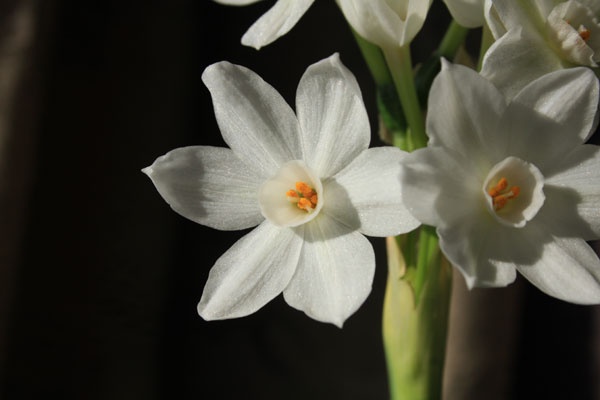
Fresh paperwhites for a fresh New Year.
(*photo credit)
January 2, 2020 Ten Components to a Renewable Energy Economy
With the upcoming election in ten months much effort ought to be expended on addressing the possible catastrophe resulting from severe climate change. Here are some points we ought to make when talking to candidates for public office:
1. A Green New Deal leading to a 100% renewable energy economy is not only possible but extremely practical; this could be promoted and supported by Federal, state and local governments.
2. All forms of support to fossil fuel energy sources (oil, coal and petroleum) such as favored tax credits, research grants and economic perks ought to stop immediately and fossil fuel funds transferred to renewable sources as well as energy efficiency applications.
3. While hydro, wind and solar are now competitive with fossil fuels, other forms of renewables such as geothermal and tidal need extra incentives to make them more viable and to assist in their implementation.
4. Fossil fuel workers deserve retraining and this could be directed to transferring their skills to renewable energy applications or to other forms of employment such as rebuilding and management of national infrastructure system.
5. Attention should be given to development of better storage of energy to act as backup when heavier demands such as from air conditioning is made to the intermittent wind and solar energy sources.
6. The national grid system should be updated and sufficient mini-grids installed for essential services.
7. Lands damaged by surface mining of coal should be fully reclaimed for local community development and benefits.
8. Outdated and dangerous nuclear power facilities should be phased out as soon as possible.
9. The movement to an electric auto economy should be promoted with adequate and speedy recharging stations available throughout the nation. Movement to a hydrogen alternative must be considered provided this can be achieved within the renewable energy economy.
10. Housing should have specifications that are fully energy efficient; encouragement of use of shingles equipped with photovoltaic coatings for individual unit solar applications should be made.
Prayer: Lord, give us courage to establish a less polluting world in which renewable energy will play an essential role.
Eco-spiritual Experiences in January
January is an ideal time to stay indoors a little longer and reflect on ways to heal our wounded Earth. Winter's intense stillness, barren trees, and sleeping flora and fauna invite a sense of wonder; our outdoor walks allow us to scan wider vistas and discover the summer-hidden wounds in our landscapes. We delve the roots of things, for winter initiates a growing season, nature's first awakening to renew life. January is precious time to observe what is truly down-to-earth, a humble grandeur that passes before us. As Herman Melville says in Moby Dick, "I am a man running out of time." The winter scenes come and go and are occasionally punctuated by severe weather events. Simply put, January is the acceptable time to sense mystery, survey the cosmic phenomena, examine our calling, order spring seeds, and proclaim the harmony all about us; it is a fleeting moment of salvation.
Experiences. In the Ignatian spiritual tradition we visualize a scene of God's unfolding creation as worthy of prayerful respect. This is an unfolding environment of which we are observers and participants. During this stay-at-home month we have an opportunity to focus on essential matters and become attuned to windows to our soul -- sight, sound, taste, aroma, and feeling. We discover the harmony of head, heart and hands; the interior harmony that is in tune with the resonance of the great outdoors and the Mystery far beyond. We seek the God who is within, without, and far beyond.
Sacred Sights. Look out on a crystal cold winter day and see beauty all around. A snow‑covered landscape is the Creator’s masterpiece; each snowflake is a different design (though certainly unverified), each curved snow drift and sparkling field sprinkled with assorted jewels, truly works of divine art; a fresh blanket of snow is like the pall covering a coffin. Icicled roadcuts seem jagged; stripped hillsides and clearcut forestlands are mercifully clothed. Winter scenes recall the divine promise to cleanse us of our faults, to make us renewed like new‑fallen snow, a promise of the springtime of a New Heaven and New Earth. In our faith journey we look ahead lest we stumble; yet our gaze must also be downward lest we lose our footing. We are attentive to our crunching footsteps as we confirm the HERE before us. God is near us.
Sacred Sounds. In the beginning is the eternal Word; God speaks in the "Big Bang" that still resonates throughout the universe and detected by modern instruments -- and it rings in our ears when we distance ourselves from discordant noises through Sacred Silence of our own making. We are able to recollect, plan, reflect, and communicate with God. We listen to the coyote's howl, ruffed grouse's thumping and owl's hoot, all blending with excited youth sledding in the snow. We seek a balance of sound and silence; we join in praise of clear winter sounds unmuffled by summer foliage. These sounds show immense contrast: tinkling falling snow yielding to winter silence. This sacred NOW is a dividing line between receding past and advancing future; we ponder in this hairline span, a nanosecond convergence of past and future.
Sacred Tastes. God's favor is a taster's flavor pleasing to many palates. To enter into God's goodness means relishing good tastes and avoiding bitter ones. We are social beings destined for togetherness; we share food for nourishment and for revealing hopes and dreams. The thoughts of "me" gives way to "WE," who are seeking community. God never leaves us alone, but is the hound from heaven; the divine invites us to form communal bonds, which draw us to collaborative benefits. "People of God" collectively are a holy WE, born again in water, blood or desire.
Sacred Aroma. Wood smoke from a cabin in January indicates occupancy, wellbeing, good will, and a sense of domestic tranquility. However, smoke elicits an ambivalence, a host of human reactions, some good and some not so. Our ancestors regarded oblations at an altar as appeasement or thanksgiving; they believed God liked the smell of roasting meat as much as the famished do. Almost by instinct, we are drawn to fire's sight, sound, odor and warmth. A few years back a smoking factory chimney signaled full employment with overlooked pollution. Bestowed with a nose we enjoy flowers at a hospital bed and incense at a liturgy. As people of God we celebrate in sacred time together with others -- and this includes our planet herself. We celebrate an aroma of the sacred and recognize the urgency to save our wounded Earth.
Sacred Touch. Our footprints are part of our bonding with the mountains, but these need be gingerly made, not leaving a permanent mark. Our bare-feet experience the land's roughness or softness, its warmth or coldness. Our arrival adds beauty to the mountains, for this speaks of love of those who bring Good News; the imprint is glad tidings, for nature is fulfilled when touched by human presence and footprint. In turn, our passing should involve faint and gentle imprints, not heavy-footed tracks of bulldozers and earth‑movers. May we see ourselves as mere pilgrims and guests, called to walk reverently on holy and redeemed ground.
Sacred space is an inviting place to pray, where mind, heart and senses find inner harmony, congruity, a pleasing ordering of sight, sound, taste, smell and touch -- all conducive to a good atmosphere. Those aware of their journey of faith realize that a local environment becomes holy and uplifting through focused observing, listening, smelling, tasting and touching; we experience the Almighty's presence as pre-taste of heaven. This space becomes our declared sanctuary, a reserved space in our hearts, where we find comfort; it is our rest stop beckoning us to permanence. Although all land is Holy Land, we designate special places, which manifest a sacredness we need in order to discover God's presence.
Experiencing the holy in times of rest is what January is all about. We need to treasure this as a season that is passing but worthy of celebration. We catch our breath, sharpen our senses, and thank God for being called at this moment in history to help save our wounded Earth.
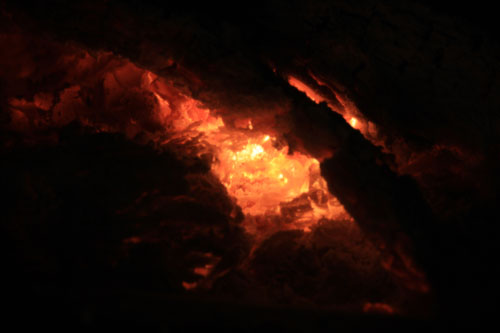
The magic of hot, glowing embers in a fireplace.
( *photo
credit)
January 3, 2020 Knowing Detrimental Effects from Wealth Disparity
Disparity of wealth exacerbates the climate change problem in more ways than one. Many do not see the connection and prefer to treat the two phenomena as separate and even consider coupling them as something impractical and blurring a focus on technical hurdles for achieving a renewable energy economy.
Disparity allows the Big Energy corporations and individuals to become the present day merchants of doubt. They desire to extend fossil fuel profits as long as possible and fail to see or care that this is a gamble that could lead to catastrophe from human-induced climate change by 2100.
Disparity results in the high costs of health care and higher education debt to be borne by the middle and lower classes; the $1,500,000,000,000 tax break for corporations and billionaires could be better spent in health care for all and removal of indebtedness and high interest rates burdening college graduates.
Disparity is a threat to the democratic process. Current regulations through Citizens United corporate money allow the use of vast wealth by the privileged few to be used to influence elections and buy candidates and entire political parties. They champion a process where it becomes more difficult for poorer people to access the polling places and times, and thus reduce or eliminate their influence in elections.
Disparity is somewhat tenuous as the lower oppressed folks either complacently strive to acquire crumbs or begin to talk about taking matters into their own hands; this latter option was in Thomas Jefferson's early thoughts about periodic revolutions.
Disparity subsidizes a propaganda machine that calls for less taxation (even when many of the rich do not pay their fair share) and less government (whereas good governmental regulations are needed for preserving a good environment). Lack of sufficient funding of our government leads to increasing indebtedness, neglected national infrastructure, lack of universal health care and constantly reduction in essential services for the people.
Disparity and its influential champions resist the redistribution of resources to where all have the essentials of life before some have retention of immense wealth. This means their "charity, the result of their voluntarily donations, is an instrument to award those holding positions closer to that of the wealthy donor -- a form of blackmail to keep moral leaders quiet. A more socially just procedure is to extract that wealth through fair taxes and redistribute it through a well monitored governmental apparatus.
Prayer: Lord, help us to exercise our democratic citizenship for protecting the vulnerable and confronting the powerful.
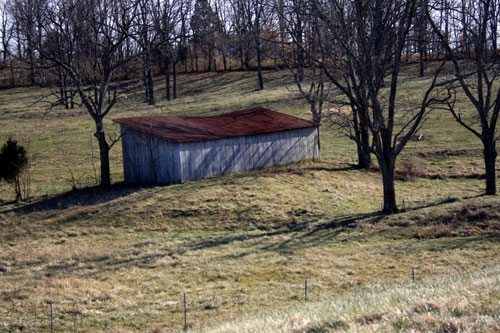
A rustic settling, Anderson Co., KY.
( *photo
credit)
January 4, 2020 Welcoming the Census-Taker
If you are a one-hundred-year-old American or just born before April first, you are expected to be counted in a ten-year census -- and this is constitutionally mandated. The United States certainly did not invent the census, but the process has come to be a valuable tool for ensuring that national resources are known, assessed, and justly distributed. The counting process has changed over time; and, from early days, when Native Americans went uncounted and slaves were only counted as three/fifths of a person, we developed a process of increasing inclusiveness. Today, undocumented workers and illegal residents are often suspicious of this ten-year national exercise, and yet census-takers and collectors are bound to confidentiality in regard to individuals.
Certainly census-taking is a chore both for the one doing the tabulation (who is at least paid) and the one giving information. Those of us who have used census data in researching past residents have discovered that inaccuracies are sometimes present. I discovered that one person, the father of an elderly neighbor, was listed with three variations on his first name for three different censuses -- in 1840, 1850 and 1860. However, once we accept such inaccuracies in names, ages, income and education, the cumulative information from a series of censuses still gives a valuable pattern of who we are as a people.
Having pursued a long-time hobby of compiling the ethnic composition of the United States, I await the 2020 tabulations. I have the data for the states, counties and some major cities in the 1980 (undigitized), 1990, 2000 and 2010 censuses. We have these results published on our website, "Ethnic Atlas of the United States." If we live so long, we now want to develop a moving picture of the differences in ethnic composition with results from the 2020 census. This may be a wishful goal, but our computerized version of maps from previous censuses can be readjusted with the proper care to reflect the changes. The Hispanic picture has been in such a flux along with the status of Asians and certain Middle Eastern groups that the results may be worth public viewing.
The message here is to cooperate with census-takers for they are striving to do their best -- which is also a patriotic duty. Our American census is used by government, business, academic and civic groups for setting priorities and distributing needed services. The House of Representatives' reapportionment is based on state-by-state and national totals. Every person ought to be counted for the good of our welfare as a people. Defend the practice, for we have a right to be counted and our country needs to have all residents included. Let's welcome those who have to do the job, and let's make it easier for them.
Prayer: Lord, give us the grace to welcome strangers, even those who are census-takers. Inspire us to encourage this sense of hospitality from all our neighbors as well.
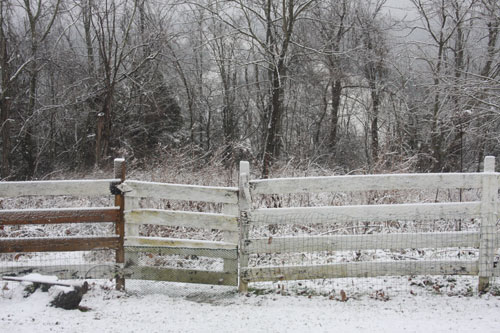
A quiet winter scene.
( *photo
credit)
January 5, 2020 Epiphany: Tell It Like It Is
Epiphany (usually celebrated tomorrow) is derived from the Greek, meaning an "appearance" or a "manifestation." At this time of year, it is part of the Christmas season and refers to the manifestation of the Christ or Messiah to the rest of the world beyond the Holy Land. It is a global culmination of the Christmas season and the Incarnation event. In some churches of the East the event is combined with that of the Baptism of Jesus and the visit of the Magi. Epiphany is truly a global festive celebration of the coming of Christ. Each year we read the same liturgical selections and that makes new themes a challenge. However, theologically the selections for the Liturgy have a rare richness, especially in developing the universality of the coming of the Savior, and the coming of the nations to receive the Word of God. There are many extended applications to Epiphany that afford wider transparency.
Ecological signs: Some would like to deny the conditions of our world of the privileged consuming vast quantities of physical resources, when others are in need of food, clean water, and proper lodging. Frankly many environmental emissions are growing even in these enlightened times, and a wave of denial by the affluent is retarding meaningful efforts to curb human-made disasters. Climate change has an ever shrinking time to be successfully addressed.
Financial openness: Global, national, regional, local and domestic financial concerns make this a time of being truly honest about priorities with limited financial resources. Thus a new economics is truly in order, one that features renewable energy. Some actually hide their rather desperate condition, although their situation ought to be known as grounds for a new world economic order of sharing resources with those in need.
Personal extravagance: Closely related to the above two is the issue of people enjoying materials far beyond their means. It is a people driving recklessly to a cliff and enjoying the few minutes left in utter abandon. We need to come to terms with our physical and mental health as well as with our tastes and demands, some of which go well beyond reason. An epiphany may occur with a physical exam or with an analysis of resource use, or a closer look at use of electric devices and vehicular travel. We must know ourselves.
Spiritual demands: We are a collective people on the road and that means not excluding others from our material privileges, but rather understanding the needs of people everywhere; we must seek to obtain a just redistribution of resources so all may live in peace and harmony. What Epiphany calls us is not to ASK the rich to part with their abundance, but rather to DEMAND it. To move forward with redistributing the world's resources is a spiritual act that is all too long overlooked or denied or postponed.
Prayer: Lord, help us to be transparent in a most pronounced manner so that the world may be a better place in which to live.
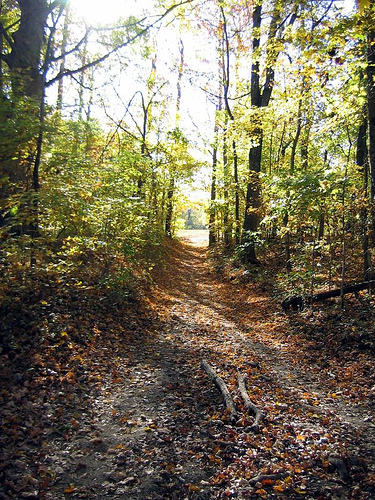
A view along the Natchez Trace, Tennessee.
(*photo
credit)
January 6, 2020 Weighing Pros and Cons of Electronic Books
The world of publishing is dividing rapidly between digital reading matter and paper hard copy. More and more young people do their reading with new electronic devices than do our shrinking elder populations. They have never acquired that contented feeling of annotated books on nearby shelves -- though the glory of such personal libraries is somewhat exaggerated. At this time public libraries are diversifying into becoming centers for civic and educational meetings and local activities and less on containers of hard cover reading materials. I find myself with hearing problems and more open to acquiring information from new sources.
Electronic books are cheaper. Book-starved developing regions of the world are hard to reach from lands overstocked with hard copies -- and so they were turning to electronics just as they leapfrogged over land-based phones to cell phones. Many residents of central Africa and Latin America are finding that choosing electronic books means transferring from school and domestic libraries of expensive printed books to thousands and millions of electronic books now available via the Internet.
Electronic books are easier to produce. My own quandary extends beyond distribution to the effort it takes to produce printed materials in contrast to electronic copies. Changes that need to be made can occur with less effort through electronic adjustments than through changing the presses. Furthermore, books are easier to store in disk fashion, as a library can be carried around dangled from one's little finger. Try carrying a voluminous library about with you from place to place. In addition, the electronic book is often easier to access for it can be word- searched or flipped through so much more quickly than can its printed cousin. Getting to know its very existence, especially if not a popular subject or title, involves easier searches that permit accessibility by seekers of certain rare subjects.
Electronic books are not only IN the future but are THE future. However, drawbacks remain. Books have more permanence and are not destroyed by a nearby lightning strike (though libraries burn down). Printed communication is not dependent on new technologies and delivery systems, making older ones so outdated that they become useless, like floppy discs containing valuable information. Those with eye problems can adjust electronic books to the proper type size to suit one's purposes -- but larger print book are also available. Printed paper matter is a valuable gift worth giving as a present to another; it allows for longer periods of relaxation and reflection for those trained and steeped in certain forms of meditative reading and photographic reproduction. However, we are assured that electronically-reproduced photos can serve the same purposes and also be accessible very quickly.
Prayer: Lord, help us to receive the Word in a variety of ways and with open hearts and minds so that everyone benefits.

Nepenthes ventricosa hybrid, potted. Native of the Philippines.
(*photo
credit)
January 7, 2020 Recognizing Houseplant Benefits
This reflection was first written on a day the BBC was announcing that deep austerity measures in the United Kingdom included curbing maintenance of office potted plants. Why the fuss over indoor plants? I have houseplants but am no authority, for mine seem to linger but not flourish. Let them be received as gifts and encourage the room user to water the plants on a regular basis. Over time I have had a Christmas cactus that had an annual red bloom; there has been parsley I bring in at frost, basil plants, tomato vines, an inherited water plant, and an aloe vera for cuts and burns. Domestic or office plants have benefits:
* Care for creation -- Help fulfill the need for everyone to care for the environment; even the less able can tend to plants in some meaningful fashion through regular watering and maintenance;
* Interior atmosphere -- Enliven the interior of the house or office in winter with a form of greenery and life;
* Natural air purification -- Freshen the space in a natural manner in a rather inexpensive way through presence of houseplants;
* Environmental commitment -- Plants show the occupant to be a nature-friendly person who affirms life in more than mere words;
* Practical products -- Plants furnish a source of beneficial products for the resident that include fresh seasonings and medicinal remedies right at hand;
* Opportunities to touch soil -- Plants have the potential to be repotted or subdivided over time and thus give a chance to get one's hands dirty;
* Meaningful gifts -- Use the sub-divided potted plant as an ideal gift to others who need to enhance their own living space;
* Gardening skills -- Consider the effects of growing on a small-scale as a launching pad for braving the raising of more plants outside when the growing season allows;
* Personal responsibility -- Regard growing houseplants as beyond being an adult or womanly task and include kids and males;
* Conversation pieces -- Discover connections with people who also value houseplants as part of their everyday experience; and
* Potential prizes -- Remember to be proud of what is grown. My mother won many ribbons for her healthy houseplants, which she barely mothered but always dearly loved.
Prayer: Teach us, Lord, to value the floral life that is near and dear to us through more gentle beckoning and extended care.

Backyard finding: Unidentified mushrooms
(*photo
credit)
January 8, 2020 Lawns or Wildscape: Presenting Divergent Views
The well-maintained lawn holds a strong grip on the American cultural mentality that is hard to shake. However, differences in lawn care exist and include some reasonable characteristics worth noting.
Position one embraces lawns according to city and housing regulations and demands. Keep monocultural grass mowed to a certain length, and do it religiously in certain set times no matter what the cost in money and personal expenditure of energy. For the sake of uniform beauty of urban landscape conform to the local demands. Keep a manicured look, a sterile cleanliness that imitates personal hygiene. If someone's lawn is unkept or not mowed once or, God forbid, twice each month, the burden rests with the non-mower to conform lest home prices in the vicinity decline. Lawn care must always come first, even before personal health problems and ordinary chores. Shaggy lawns are simply never permitted.
Position two is that a wildscape is something beautiful to behold. Think of the benefits: no pesticides; the presence of pollinators so threatened by poisoned lawns; the blessed silence of no power mowers; the lack of carbon footprint and emissions in the atmosphere; the changing seasonal landscape and all that this entails. The diversion of precious lawn care resources CAN be more than negligence; it can be turning attention to meaningful causes.
Both positions are more than words; they are upheld to a critical world through divergent deeds. Both positions have their own lifestyles. One is a twentieth-century phenomenon of the clean landscape devoid of buzzing things and birds but uniform, much as the minds of the home occupants. It is the world of bowing to the wishes of neighborhood conformity; it is the world of good citizens who agree in all things, think alike, and live in areas where all are expected to aspire, recreate, eat, worship and live alike.
The wildscape mentality is to say that nature is good and it is a comfortable place in which to live with other fauna and flora.
Let nature take its course; when drought comes there is no artificial watering; there was no fertilizing and seeding and constant caring for beds of cultivated this or that. Permaculture in trees and berries and other plants have priority.
Why the clash in cultures? Mainly because the first category is allergic to the second, and the second depresses the first. The different values make coexistence a little more difficult. The answer is that some have a sense that housing is an investment in which they make a temporary commitment -- and there is some truth in this. What is the outcome of the investment -- higher home prices or a more comfortable place to live? Lawn care displays differences; tolerating the differences demands variety in lawns.
Prayer: Lord, teach us to know our physical options when it comes to maintaining an environment and to tolerating neighbors.
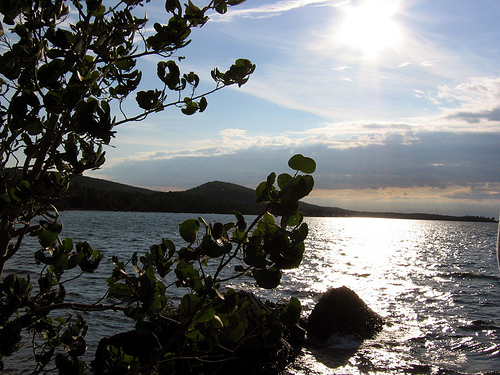
Choppy waters of Norway Lake, Kenton, MI.
(*photo credit)
January 9, 2020 Failing to Say Goodbye to King Coal
Yes, we would like to move from a fossil fuel economy, but with energy demands for air conditioning and electronic devices so critical, it is not an easy thing to accomplish. While gradually diminishing in number, coal powerplants are still essential to the current energy economy no matter how we currently do calculations. Saying "goodbye" to coal is proving to be a three-decade project. Unfortunately, the same can be said for saying "farewell" to unsafe and out-dated nuclear powerplants.
Compassion is in order for those who are displaced from the fossil fuel industry; many hope they can find work without leaving the homeland they love. This will not come easy, any more than it was for blacksmiths in the transition from the horse to the auto economy in early 1900s. Our railroad town of Ravenna has seen the change in a major way; certainly, since 2016 the seven weekly 110-car coal trains have completely ceased coming past my window. The once busy coal mines near Hazard have been idled mainly due to some renewable energy but more through cheaper fracked natural gas.
I have always opposed surface extraction of coal from Appalachia and have spoken, up for the need to reclaim damaged minelands. This situation is more acute in our fragile Appalachian region than in more easily reclaimable flat plains further west. Accepting coal as an intermediate fuel before the transition to a 100% renewable fuel economy means depending on it for a dwindling portion (40% to25%) of our electricity for a decade or so more. Granted, renewable energy sources now exceeds nuclear power in this country in contributing to national electricity demands -- but these overall demands rise even with increased energy efficiency.
There's some hypocrisy involved when we still use coal -generated electricity (even with our parish solar arrays) to some degree and yet know the emissions from the generating plants harm our environment; we are cutting down through energy efficiency. We cannot benefit from coal while totally knocking it, and heavily criticizing it without qualifications becomes a weakness that the fossil fuel industry is quick to show. When living in a partial solar economy we can start to speak up for renewables and press for a national will power to make the total transition rapidly.
Will this year mean the half billion dollar annual tax breaks and subsidies to the fossil fuel industry, while only a fraction of this currently goes to renewable energy? A reversal of favors would mean that the Green New Deal focusing on support for renewable wind, solar, hydro and geothermal sources would proceed at an even more accelerated rate. We are moving away from coal and oil with each new electric car and wind or solar farm, but not fast enough. The emerging climate change problems potentially quite serious and inspire us to hasten to a renewable energy economy.
Prayer: Lord, help us to be support the changes that are undoubtedly coming, and to address all transition problems.
Reflections on the Glory of Creation
For the year 2020 we are considering an eco-spirituality that is needed by activists to meet Earth's current challenges. Our shared belief in a future for our Earth leads us to reflect on the glory that must be enhanced as well as the awesome power at our disposal to help save our threatened planet. Yet you have made him little less than a god, you have crowned him with glory and splendor (Psalm 8).
To see beyond ourselves. During January we imbibe winter's stillness, a mood that allows us to discover all creation wrapped in mystery. We note how toddlers examine the world around them with awe and wonder; they like to put foreign objects in their mouths and look behind every curtain. Adults seek equal surprises and are fascinated by new places, sunrises and sunsets, strange artifacts -- and the uniqueness of the seasons. Time to time, we ponder about nature's laws, origins of life, our place in creation, and our consciousness of harmony in the universe. We appreciate creativity expressed through artists, craftspersons, researchers, and homemakers. Gratefully, we are willing to differentiate the components of what is mysterious: the created world around us, our own interior mystery, and finally deepest Mystery, the Holy One, our ultimate Source and our final End, our Alpha and Omega. These components unfold for us over time as a personal revelation.
a) Mystery all about -- We go to a park, wildlife reserve, mountain, seashore; we gaze into the heavens. We observe captivating creatures; we breathe fresh air and absorb full spectrum sunlight. We notice the parade of flora and fauna: trees, birds, wildlife, forests, rolling meadows, gurgling streams, the roaring seas and waterfalls, and more. A billion poems and a trillion memories punctuate these mysteries of creation; yes, we are often moved to record them. God admires all that is made and finds it good (Genesis 1:3). Childlike wonder extends to the discovery of goodness by each natural adventurer. And when we're no longer able to travel to glorious sights, at least we can enjoy vicarious pleasure in photographs, videotapes, scenic books and vivid memories. And when memories fade, we greet visions.
In seeing creation we strive in our way to transform it. In the early 1970s the late Rene Dubos spoke to the American Association for the Advancement of Science meeting on this subject of restraint and involvement in nature; essentially he proposed that human action and improvement are part of the natural process. He argued that we, as part of nature, can transform it for the better. He was a friend and our earliest and most respected advisor at the Center for Science in the Public Interest; he wrote several books, including The God Within, and gave us great encouragement. Rene was an enthusiastic organizer of the Stockholm UN Conference on the Environment in 1972.
b) Mystery within -- Creation that surrounds us reflects the divine glory and encourages us to delve into discovering wonders of creation within ourselves -- an untapped world. We reflect upon our rational processes, our relations to others, our neighbors who include distant human beings, along with diverse plant and animal species. In knowing others, we discover that every person is unique. By seeing mystery in others, we arrive at greater knowledge of ourselves; we mature and grow in the mystery of self-appropriation in our journey of faith -- and the infinite world within -- provided we not selfishly idolize ourselves.
In more proper individual growth we can probe the mystery of self and say with humble Mary, from this day forward all generations will call me blessed, for the Almighty has done great things for me (Luke 2:48-9). Beatitude has a divine source and to acknowledge it is humbling; all of us have unique gifts and must share them with others in our journey to deeper Mystery. We ask over and over: Why? Why? Why? Each partly answered question affords still another about a world emerging before us. Answers are never satisfying in isolation, for we are invited to move beyond ourselves to the needs of those who cry for help. Our inward journey is not solely alone, for we travel with others.
c) Mystery beyond --As believers we affirm that God is deepest Mystery and the source of all mysteries around us and within us. From early days, we were captivated by the mysterious in the natural handiwork with the beckoning call of God imprinted on it. We gradually look within and far beyond ourselves and find another world of Mystery that is both puzzling and inviting. God does not leave us unattended; we Christians find in Jesus Christ the seat of ultimate Divine Mystery, who we approach in reverence through sacramental life. We trust his words -- To have seen me is to have seen the Father. (John 14:9b). Jesus is faithful; he guides us through our wilderness, our bewilderment. Jesus is the gentle companion amid the glorious array of creation, all reflecting divine glory. He beckons us to incomprehensible Mystery that is destiny of our journey of faith.
God is Mystery. God, the Creator be praised! Let nature's beauty unfold! Let me be drawn to Mystery as a moth to light! And may we continually move closer to that light! Ever since God created the world the divine everlasting power and deity -- however invisible -- have been there for the mind to see in the things God has made (Romans 1:20). Human beings unguided by Revelation tend to create their own gods to fill their void. Mysterious artifacts can easily be made objects of worship in this age of materialists. Our faith's journey, when graced by divine favor, allows us to enter the deeper realms of Mystery through personal interaction. We could not find those realms without revelation; once invited into the Divine Family, we find a sure footing for meaningful activism in company with all others.
With a sense of respect we see our goal and commit ourselves to help renew the face of the Earth. Humbly we recognize the power to act in God's name and the need to cooperate with others who believe in a meaningful future.
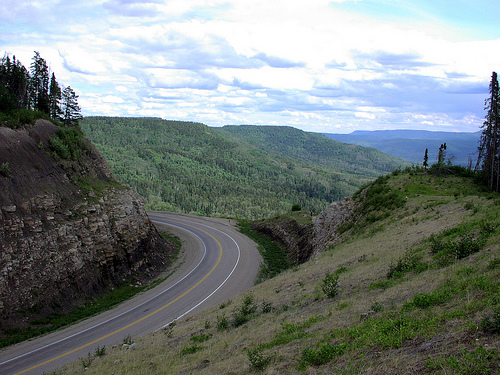
Breathtaking overlook north of Fort Nelson, British Columbia.
(*photo credit)
January 10, 2020 Attending or Avoiding Meetings
Quite often in winter, meetings have to be canceled due to bad weather conditions. Some meetings are quite necessary; other gatherings are routine and habitual; a few meetings are wasteful of time and energy. The first class of meetings is honored and needs rescheduling; the second group can be cut and streamlined; and the third ought to be avoided and suppressed because the existence of these meetings sets a priority to distracting issues. I define weekly church-going in the first category, though others place it in the second, and the highly secularized would relegate it to the third. Some people live by meetings, the social instruments that define their lives and even work. Others see many meetings as burdens requiring warm bodies to make the organizers feel good.
Discerning the importance of meetings is a critical issue for all who find travel increasingly difficult, energy levels declining, transportation costs cutting into budgets, ability to pay attention and to act civilly increasingly problematic, and other competing needs crowding into personal time and resources. It takes effort to go to and give full attention to meetings; they cut into full schedules. Consider these meeting questions:
* Do the time and resources justify going to this meeting, or is it better that I stay home?
* Am I simply following the pressure springing from compulsive meeting-goers who like to control events and perhaps even people who attend?
* Can I delegate or find others to take my place instead of every warm body going?
* Is the burden so great that attending depresses me and makes me to irritable to offer good feedback at the meeting?
* Are the meetings properly prepared and enticing in themselves or can they become a burden on those who find it difficult to give full attention?
* What will be the possible outcome of the meeting and could its goal be successful through electronic conferencing, telephone calls, e-mails or printed materials?
* Is the face-to-face meeting of prime importance to knowing the character and reactions of participants?
* Could the frequency of the meeting be reduced for the good of all parties so that some face-to-face meeting is available but in less frequency?
* Are all hidden benefits, such as development of social bonding that may be needed in person-to-person contact, be compensated for in different ways by all parties?
* Since air travel and auto use considerable fossil fuels one should ask: Are all these energy and resource costs justified?
* Do all people qualify as participants or is the anticipated meeting quite passive while listening to invited speakers?
Prayer: Lord, reduce the number of meetings that I must attend and help me to have courage to attend those that I must.

On the move. Opossum, Didelphis marsupialis.
(*photo credit)
January 11, 2020 Baptism: Called by the Exclusive ONE ...
This is my son, the beloved; my favour rests on him. (Matt. 3:17)
There is only one God; no other gods are tolerated. The Hebrew Scriptures speak loud and clear. God demands exclusive worship and attention -- and with this solemn demand God directs the Israelite community to prepare the path -- to a common global worship. The commons was divided at Babel into islands of groups worshiping material things and false gods -- and this division still exists. To reclaim the commons of singular attention to God is the initial call to a chosen people on whom had been bestowed a solemn vocation, as these people work together to bring about global unity. Rather than let the Israelite community be a static faithful remnant, the message went forward -- and that was what the Baptism of Jesus was all about. Amid great solemnity a Messianic journey was launched at the Jordan River to reclaim a world and, a fortiori, the commons.
The Babel tower twists the Divine Command and this twisted image still hangs over us; this man-made structure overshadows a divided world grasping for privileges that are of human origin, causing people to strive for exclusive privilege built on cultural insularity, competing islands of self-interest with an inclusivity of gods of every type. Jews and later Christians and then Muslims have often misinterpreted the message; they have thought of themselves as exclusively chosen or saved as though in a static way. These mistaken folks may place inclusivity in forms of idol-fashioning that help them retain their privileges; they dare not declare that they really worship mini-Capitalistic gods. The materialist "exclusivity" is the justification of vast possessions by billionaires although while they live in utter luxury many of the poor are still insecure; the materialist "inclusivity" is to include tolerance of all forms of hidden and public idols.
The sound of the roaring Jordan below Mount Hermon still rings in my ears, a musical prelude to the event of Baptism, that I had the privilege to hear in April, 1992. Jesus is a covenant of the people, the light of the nations, to open the eyes of the blind, to bring out prisoners from confinement, and from the dungeon, those who live in darkness (Isaiah 42:6-7). The process of reclamation needs one empowered to act and clothed in divinity. Thus the solemn task ahead of us is a task launched long ago as narrated in the account in the third chapter of Matthew. The process requires a divine leader going ahead of us, a light for us all to follow. Such a leader at a singular starting moment is exclusive, for it is from God; it is Godly; it is a divine Messiah's mission. The divine exclusive ONE is Emmanuel among us.
Prayer: Lord, help us to reaffirm to our Jewish brothers and sisters that their mission is still operative, and that we as part of the human family affirm it to be to spread the Good News that God alone is to be served and worshiped. God is exclusive; we are missioned to act in inclusive collaboration to bring this about.
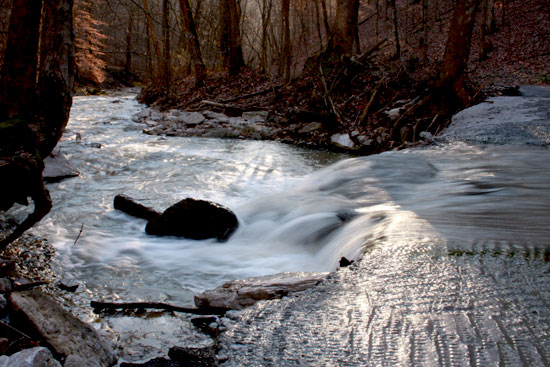
A rural Kentucky stream. Anderson Co., KY.
(*photo credit)
January 12, 2020 ...To Reclaim the Commons by the Inclusive ALL
In truth, I see that God shows no partiality. (Acts 10:34)
The commons is the gifts given to ALL peoples, not to a privileged few. In turn, all ought to participate in the fruits of these gifts and help preserve them for others -- and in doing so become acceptable to God. All participants from every nation who act uprightly and fear God (Acts 10:35) are part of a cooperative whole, a people of God invited to take part in the commonality of cooperative effort. Christ follows the prophets of the Old Testament who are called by God; now we follow Christ the leader and Light of the World. His coming was urgently desired; our following has an urgent aspect as well. John the Baptist, hesitant at such an awesome task of baptizing Jesus, encourages us to present Christ to the troubled world. Our performance moves from exclusive calling to inclusive participation with all people of good will. God invites us to a common enterprise in which we have unique gifts to share -- not meant for privileged retention.
Peter, as human leader, comes to realize that the Almighty demands a service not a special privilege. God's favor extends to us, but we, like Jesus, accept it by humbly descending to the baptismal water. Our gift of being part of the body of Christ is not merited; we now must freely share this gift as a humble people. Peter says, "God can evidently grant even the pagans the repentance that leads to life" (Acts 11:18). Theirs is the universal response of all people of good will who, on hearing the Good News, seek to glorify God. Baptism changes our lives; it removes the tarnished condition in which we go into the water; as we emerge from our Jordan, we find new life to color our entire journey of faith. Baptism is our launching pad, the most important moment between our birth and our passing from this life. Our task ahead includes entering our work with our unique gifts and within a community where these gifts are self-reinforcing.
"Inclusiveness" properly involves universalization of the participation process -- not the exclusivity of a Jewish people as recipients and retainers of privilege, but the inclusivity of their goal of adoring one God, now worshiped by half the world's population (also Christians, Moslems, and Baha’is). It includes a message of unity to Hindus, Sikhs and all who fear God. "Exclusivity" is not an individual human, racial, or national privilege but the direction of our worshipping focus on God, YHWH, and God alone. The message of our inclusive cooperation in salvation goes out to the ends of the world -- and that is an ongoing call to Jews and now to Christians and others. The proper use of the commons (not as tolerating a multitude of material gods but as our joint common essential means to salvation) allows us inclusively to worship our exclusive God, Creator of all.
Prayer: Lord, help us to see the divine redemptive process as a total gift from your exclusive Majesty; teach us to see our unique gifts to be freely shared, not selfishly retained.
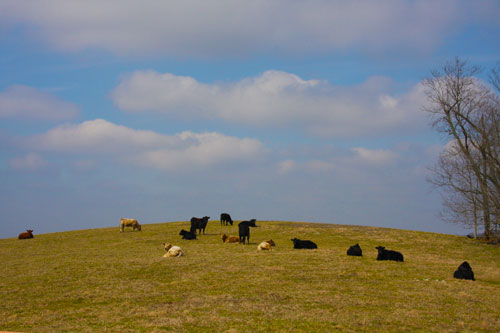
Gathering of the herd. Cows in Washington Co., KY.
(*photo credit)
January 13, 2020 Overcoming Barriers to Physical Exercise
In the dead of winter we are often tempted to forego what virtually all health care experts recommend for the young and the old alike, namely, daily physical exercise (PE). Granted, this is for many folks of all ages the hardest month to continue such a PE routine. If none of the following affect you, then just keep going, but encourage others who encounter one or other of these barriers or winter-colored excuses.
Too far from exercise place -- Some people travel to a favorite jogging, hiking, swimming or exercise place and thus, when weather does not favor such adventures, the exercise is the casualty. One response is to have alternative exercises (an indoor exercise bike or rowing machine) and this alternative or companion exercise regime becomes predominant in inclement weather.
Too exhausting -- This excuse is often the major one that curbs exercise when the excuse is aimed at reducing the amount of PE. Experts say that the minimum PE can be quite brief (fifteen minutes to a half-hour each day); I strive for at least one hour. Furthermore, the type of exercise may prove too strenuous as a routine and an alternative may satisfy sagging energy levels.
Too uninteresting -- Yes, doing the same routine over and over may prove unappetizing to some tastes. I find that playing mental games or keeping count in order to reach specific goals or praying the rosary are all helpful. Some people do not like to exercise on their own, and so need companionship for encouragement; others use television or radio to occupy their time; still others find certain routines perfect for meditation and serious prayer.
Too dangerous -- Bikers or joggers may have chosen too busy a street, and some modification in route or time of exercise is necessary for safety's sake, especially when roads are icy.
Too harsh -- Certain muscles may be overly taxed or, due to changing body situations, we may have to choose a different physical exercise. When my back gave out, I had to stop jogging, and others change due to knees or hips or other joints being unable to withstand the constant strain. Again, variety and amount of exercise may have to be altered, and that can be for the better.
Too embarrassing -- Some prefer not to be seen exercising; one solution is to make the physical exercise less public.
Too time-consuming -- This excuse is most likely the greatest temptation for busy people who can justify removing physical exercise from the daily routine -- but maybe that is a major mistake. Again, what do we do with free time?
Prayer: Lord, help us see that our physical body needs proper care at all times in our lives -- and especially in winter months.

A wall of ice along the Kentucky River.
(*photo credit)
January 14, 2020 Making Long-Range Garden Plans
In the sterile coldness of mid-winter when outdoor activity is harder to imagine, we attempt to compensate by turning our minds to the upcoming spring gardening season. A planning pad and pencil can replace spade and hoe. Looking ahead combats any form of winter depression or the temptation to postpone such thoughts to another day. No, when nothing else is pressing try the uplifting feature of winter planning for spring planting. A caution is in order: overplanning straight-jackets future creative work in the garden. Humans plan; God laughs. Compensate by accepting that no plan is cast in concrete and always worthy of modification according to changes in weather and growing conditions. However, a few time-tested planning points are worth noting:
* Last year's review -- Assemble data on what occurred in 2019 as to varieties and yields, taking into account the hot summer or the amount of rainfall during the year. Note what is worth repeating and what ought to be modified or dropped;
* New variety choices -- Decide on some new crops or shrubs or berries and pick up the books and literature and study contents for ideas and varieties;
* Seed ordering -- Look through the seed catalogs that came in over the past few months. For those who trade with other seed savers, now is the time to do the ordering. Choose some new varieties depending on what has been learned over the year. Just perusing photos and illustrations of luscious fruits and vegetables can be quite uplifting in this dormant season;
* New techniques and practices -- We should all try something new each year as to technique (extend fall gardening, or grow a new leafy green or root veggie for the first time, or use a new gardening device). This may mean a rearrangement or expansion of growing areas, or it may mean taking better advantage of shaded or sunny areas;
* Tentative design -- Refrain from getting carried away and overdesigning a garden space. It simply will not work and will lead to disappointment in mid-growing season. The playful approach allows us to think up new economies of scale, numbers of plantings, sequence of growing (spring, summer and autumn garden space), and other possibilities. In fact some designs will be followed even though not rigidly adhered to for the next season; and
* Fresh beginnings -- Looking back to older times when "hotbeds" were more popular, remember that this is the time to start plants in greenhouses or protected areas. In this manner, the growing season is initiated far ahead of time.
Prayer: Lord, give us a sense of the season, and ready us for the work ahead through careful planning and forethought.
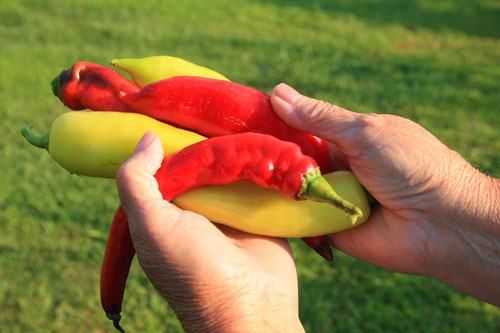
Remembering summer harvest.
(*photo credit)
January 15, 2020 Moments of Sorrow
Then they will say to the mountains, "Cover us!"
and to the hills, "Fall on us!"
(Hosea 10:8; also Luke 23:30)
Reflection:
Our mountains move -- yes sliding, tumbling
as fragile cover is skimmed away,
exposing jet-black coal, the fuel
that turns the urban night to day.
The soil and saplings slip downslope,
and they can't climb back up again;
down, down to rivers and streambeds
to smother fish and wildlife den.
Mountain movers dig up the dead
and bury down the living fold,
root up graveyards and oaken groves,
erase homes two centuries old.
All for pockets of distant wealth,
and when the silent land calls down--
Reclaim! Reclaim! Wager it'll be
profiteers reaping a second round.
Will hills take in our compassion
and forgive all offenders' sin?
Will we cease to make the hills fall
and start to build them back again?
AF 2010
Prayer:
All Merciful Lord, give us the grace of compassion for our suffering highlands, and help us to halt the damage done to them, and start the reclaiming work with a renewable energy economy.
------------------
The entire passage is taken with permission from the section entitled "Compassion" from our book Mountain Moments, which can be obtained from books stores or regular Internet sites, from the publisher, Acclaim Press, or from Amazon Books.
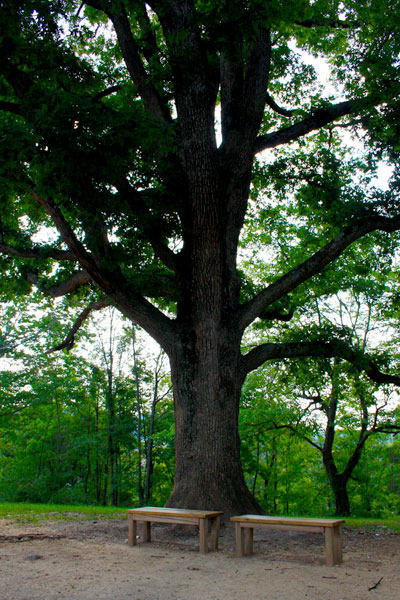
Empty seats.
(*photo credit)
January 16, 2020 Converting "Retirement Years" to Public Service
No healthy and energetic person in adult and senior age should "retire," for that is a category fraught with difficulties. The category of "retirement" relegates older people to a lesser role in our society, as prized jobs are intended for the younger members of society. In this way of thinking, the individual must exit gracefully to senior villages and golf courses, fishing places and tea parties. Nonsense. People of so-called retirement age can be prime contributors to society, for their past experience is valuable and the distracting drive for professional ladder-climbing is no longer most prime.
Senior opportunities are galore. "Questioning Retirement" (see January 29, 2018 Daily Reflections) focuses on the problem of people moving from a steady occupation or office to a time of fun and games. Others say that such approaches are sophomoric, selfish, and quite often life-threatening. For the ever-working soul, being of good health and energy is a gift from God and the "R" word really has to be taken with qualification. Health is such a blessing that, when we have it at whatever age, we must use it in the service of others. If "retirement" means halting the particular work in which one is engaged, it becomes a confusing designation, since so many people change jobs. Today a host of early military "retirees" are perfectly suited for further public service. They are often even in their forties and fifties. With the gifts of health and with acquired expertise, normally those in their sixties and seventies have opportunities for further service.
Choices ought to be made wisely. Often, seniors know their own limitations as to types of work; they need to choose wisely, since some programs that could be quite enticing to younger people are unsuited for them. When people are able to do overseas work, they should realize their language and cultural limitations and possible medical and dietary needs. Often, the so-called early retirees, whether from the public or private sectors, enjoy good health and accumulated experience and are ideal candidates to be volunteers at the service of the less fortunate both in this country and overseas. God's call extends to people of all ages; retirees should listen to the prompting of the Spirit.
Senior gifts are different. Older volunteers offer gifts of wisdom, experience, and patience -- things often in short supply in the youthful inexperienced who are more concerned about career launching and livelihoods; such real-life pressures may no longer strain elders. However, some feel a need for further income. With more time to spare, many elders can extend genuine hospitality and provide a listening ear to those in need. Elders know the community with its strengths and weaknesses; they have connections through longer term social networking -- a true asset for those in need.
Prayer: Lord, give us the ability in older age to see what we can do by offering ourselves at the service of others.
Reflections on Eco-Spirituality
An eco-spirituality needed to renew our Earth must involve listening, tasting and touching many aspects of our world around us, done in a prayerful manner.
Hearing creation's sounds. We listen and hear God's call, a winter call extending into our spring, summer, and autumn of life. Yes, we are called in that eternal winter before birth, in ages before being the glint in our parent’s eye. We enter God's ever present tense and have a place from distant eternity and, once existing, we hear God's call in the emerging seasons of our life; these can be dramatic (St. Paul knocked from a horse) or calmly but persistent within our journey of faith. When we turn away, God calls us again and again to energize our life's journey. We are free to say "yes" or "no" and, when being negative, we are mercifully called again from alluring detours.
The phenomenology of life's journey, the "travelogue of faith," is often overlooked in our rush of everyday busyness and our failure to stop and listen. Each person's venture is unique with its challenges, burdens and high points; each of these ventures follow similar patterns of personal transformation. Our paths are not in isolation, for we are assisted by friends, companions, spiritual directors, and counselors who direct us to pause and ask, where am I going? Is the current effort worth it all? Are we meandering about or on the proper course?
Many times precise spans of the seasons of life are not understood until the very end of our Earthly journey, when we prepare to advance to deeper Mystery. Will it then be too late? In freedom, we are all invited to respond in a commitment of faith. We are baptized in a faith community and are fortified by the sacraments. We enter our mission in life using the talents at our disposal. We discover moments and places to bring Good News through word and deed, "Go out to the whole world; proclaim the Good News to all creation." (Mark 16:15) And likewise all our neighbors, even plants and animals and troubled Earth herself, call for us to act; we are to avoid our attachments and enter into the struggles of sufferers with a sense of growing compassion.
Tasting and Smelling God's Creation. I begin down-to-Earth, in the microcosm, the world of earthworms, insects, composting soil bacteria and decaying leaves, a world of humble glory. Respect for all creation includes the vast universe; however, it deepens both through the life sciences and theology working cooperatively within their separate and related fields. Many start by looking up to the heavens with awe and respect. But can we look down to earth with similar respect? I shy away from distant then (incomprehensible past), the way out there (cosmic distance), and the learned they (cosmologists). God's creation beneath our feet is truly here, immediately now, and easily shared by we who get our hands dirty. Raw earth is ground of being, womb, destiny of mortal remains; it is something we smell, taste and touch. Earth, fragile mother, is essential to my eco-spirituality.
Feeling Harmony within Creation. All God's creation reveals harmony which we detect through our senses. Harmony is like a faint enticing perfume; it is delicate and touches on biodiversity of flora and fauna, carbon and nitrogen cycles, wildlife migratory routes, ingenious construction of a den or nest, complex language of singing birds, timing of budding trees, forest understory, and on and on. Harmony is introductory, when controlled and not allowed to become paralyzing. It includes music, celebration, worship, home and community life, and ordinary decorations, but it takes an effort to control for it is more difficult to create than is disharmony; it soothes the soul and when socially appreciated leads to collaborative activity. Harmony involves giving and receiving, engaging performers and receptive audience. In the image of God we inherit a godly impulse to harmonize; when failing to control impulses we can create socially damaging disharmonies.
When we stop and listen, we hear distant resonances. Is that the Big Bang? Are past events in harmony with future expectations food for a meaningful present moment? Does a receptive challenge us to improve our interior harmony, our likeness to the divine? Does Mystery call out as a beckoning attraction that makes its demands on our reflection and practical application? And are ordinary folks the models drawing us to change to a better quality of life, free from terroristic basic food and health insecurity?
In responding to our emerging mission we take pride in the work of many hands, which we offer with bread and wine (grown, milled, baked, picked, fermented, bottled) solemnly at each Liturgy -- the work of the people. We thank God for coordination of all our body parts and recall that humans surpass other primates through dexterity and tool use; our hands are utterly important and yet dexterity requires more than hands, because a brainless or demented human being with good hands will do little. Furthermore, a heartless person with a good brain and hands can easily turn artifacts and tools into weapons that can harm the multitudes.
Process. Artifacts reflect back to the power of the Creator. Sacred icons are created in an atmosphere of prayer, the long-held windows to Mystery. The human knowing process imitates the creator's own manifestation of the Word; Earthhealing and planetary restoration are icons and rational processing, pointing directly to the Creator. Art-making is a succession of operations -- planning, model-building, theme, experiments and ongoing admiration, all which involve headwork and body coordination; art-making leads us to the deeper Mystery of God. We emphasize use of hands because eco-spirituality must be practical in renewing the Earth.
With renewed understanding we move to environmental action where the eco-spirituality that is affirmed now calls for balance. Urgency impels us to act with deliberate speed, but this cannot be accomplished without our connection to the Creator and our collaboration with believers in the future.
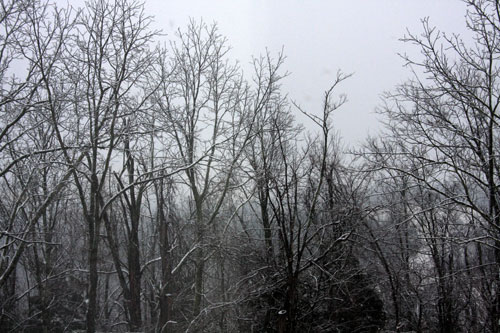
Silent Kentucky woods in winter
(*photo
credit)
January 17, 2020 Creating Work Opportunities for Citizens
There is no shortage of work to be done, only the financial resources that provide people a livelihood while working. New opportunities include:
* Infrastructure building and refurbishings -- The demand for higher paying jobs in maintaining and rebuilding our highways, railroads, shipping ports, airports, locks and dams, as well as the making of a renewable energy economic systems will require millions of workers. Higher taxes on corporations and the wealthy could easily generate the financial resources required for these public works much in the system of the highly successful WPA after the Great Depression;
* Health and home care programs -- Health care ranging from primary medical care through home health and physical therapy is a major issue in lower-income rural and urban areas. Elderly and ill people in need of treatment ought to have assistance in cooking, physical care, and travel, bestowed by individuals (often relatives who ought to receive just compensation for their services;
* Literacy training programs -- A million new citizens and several million illiterate citizens (many at older ages) are eligible for training by patient and caring people in the English language. Computer literacy is also a growing need today and younger people are prime candidates for this form of meaningful employment;
* School auxiliary and special training programs -- Much additional assistance is needed in literacy training programs, prisons, drug rehabilitation centers, health and paralegal services, senior citizen centers, and administrative offices of non-profit organizations: as managers, auditors, writers, or fund-raisers;
* Environmental experience and training programs -- cleaning up the damaged environment is of great necessity in fragile areas of our country. Nature centers and wildlife rescue centers are in need of youthful as well as experienced environmentally-literate citizens;
* Recreational supervision programs -- Millions of people from infants and after-school youth to elderly day-care recipients lack supervisory support from trained and experienced staff and other assistants;
* Beautification and freedom garden programs -- Blighted communities are in need of converting abandoned housing to park and greenspace. Supervisors and organizers for gardening projects are needed in urban areas. A program of reforestation, especially in blighted and urban areas, is very needed at this time; and
* Domestic and overseas technical programs -- Peace Corps and AmeriCorps volunteers have been a mainstay of public service beyond our borders. A wide variety of technical assistance groups such as solar cooker installers to safe-water providers are in urgent demand.
Prayer: Help us, Lord, to see authentic problems and to be willing to serve others wheresoever we are most needed.
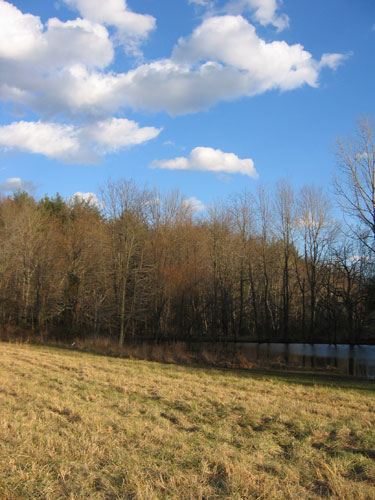
Kentucky hayfied in winter
(*photo
credit)
January 18, 2020 Forgiving Student Loans through Public Service
During January we acknowledge the divine called to each of us to be of service to others. This is of particular interest to those about to graduate in professional and technical fields. However, those graduates who are financially indebted are so burdened that their services are limited due to the pressure to repay high interest college loans. Forgiving such loans through community service is one way out and has been applied in a limited degree for some times. Currently, one outlet is service in the Peace Corps and AmeriCorps. Far more deserve such programs.
Broaden the field of public service. One needs to include education and health services in low-income and underserved urban and rural communities. The student-turned-public-service person could also be receiving a valuable apprenticeship under experienced direction that is properly monitored. Loan forgiveness could be based on a period of service, say three to five years depending on loan size. Church-related institutions that are primarily social welfare, health and education-related should be allowed within the programs. Public interest advocacy for the good of lower income communities should also be included.
Open up to early job training opportunities. Gaining concrete experience in a variety of fields sometimes involve apprenticeships that are lower paying. These programs could have the effect of bringing services to underserved areas, with the added incentive that would be provided by federally funded loan forgiveness. Advantages include a place suited to satisfying the initial training program for the graduating student.
Give incentives to the middle aged who seek to change careers. Certainly, the program should include forgiving the costs of career changes when employment shrinks in a number of technical and middle management areas. Job opportunities change and demand new training and career shifts some quite costly for lower income folks. For middle-aged people with family obligations, the burden or threat of a retraining program hangs over them or adds a severe burden to a stretched family income. New positions of service could range from senior citizen physical education and care to remedial reading programs for migrants and illiterate seniors.
Create governmental funds to replace high interest rates. One horrible dilemma facing college loan programs is the emergence of for-profit "academic" institutions, which take advantage of people seeking a higher education. When properly operated and maintained, government oversight would encourage college academic work and training, volunteerism and public service, and allow the student-turned-public-servant to leave after several years with no or low interest debt.
Prayer: Help us, Lord, to see that public service is part of our citizenship, and those who are more indebted should have this opportunity to be debt-free in reasonable time.
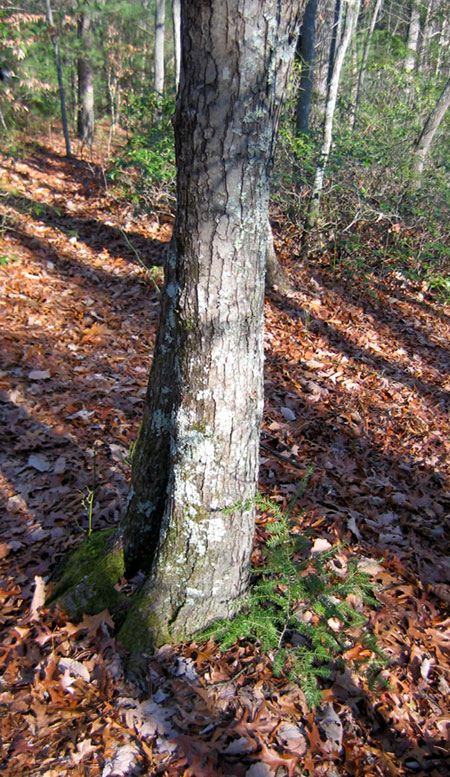
Winter in the Red River Gorge (KY)
(*photo
credit)
January 19, 2020 Salvation Reaching Out to All
I will make you a light to the nations, that my salvation may reach to the ends of the earth. (Isaiah 49:6)
In January, we review the mystery of our baptismal calling -- the great privilege to serve God according to our station in life. The calling is a gift for which we are eternally thankful. This personal calling is a sacred trust, to which we never perfectly respond. This calling is ongoing, and thus subject to an ever-deepening commitment on the part of us as recipients.
The gift of calling makes us "graced" by God's goodness. We do not deserve what we are to become; we are privileged to be invited to become God's people. Our freedom shows itself in raw but simple form, for we can say "yes" or "no" in the depths of our heart. We can be spiritually deaf and blind -- two eyes and two ears, but not the two divided in a responded "yes" or "no." Even when we unfortunately say "no," in hidden gratitude we thank God for the freedom to do so.
The trust stands heavy upon those who flee from responsibility or who are caught in false leads and detours of life; these allurements consume precious time and make us deaf to the cries of the poor. "Forgive us Lord" is said when the promises we made were not perfectly kept, and we see how golden opportunities for betterment were not followed. The trust was mercifully given; the failure in that trust, when later seen and sincerely regretted, is given once more in the freshness of an all-merciful God calling us.
The deepening in our calling is an emerging reality to each of us. We have heard but not listened, seen but not perceived, felt but it has not penetrated. An additional call forces us to see past limits now yielding to a sense of new responsibilities. In rare but very real circumstances, we make dramatic adjustments in lifestyle and manner of acting. For some of us comes the sudden acknowledgement that aches and pains indicate approaching physical weakness and mortality. The demand for treatment or adjustment in lifestyle is part of the ongoing nature of our call, for life moves on to new horizons.
Our response awaits a final judgment, but it can be one that grows in love and gratitude during the shrinking span of mortal life. The final judgment comes at our end -- and yet we have the God-given time to make the response ever better and more fulfilling. With divine grace we can do better like the Good Thief. We can speak for those in need, assist them in encouraging words, perform acts of kindnesses, and even spend time in fasting. The time left is short but it can be profoundly meaningful.
Prayer: Lord, let this be my final ever-rephrased remark: "Lord, I answered you." Help us through prayer to improve the depth of that answer, through a spiritual maturation that sharpens our response to an ever more deepening call to serve others.

Lycoperdon pyriforme, fungus on logs
(*photo
credit)
January 20, 2020 Considering Work as Curse or Blessing
I have heard the comment, "Cut the bull; who wants to work if they don't have to?" My response came after a slight hesitation, as though I was fighting as a contrarian in standing up for some form of idealized work. Yes, work can be a blessing and something more than making a livelihood out of obligation for self and loved ones. Service for others often involves steady dependable work. Christians, we know that Christ came to serve and not to be served; we are called to imitate him and do the same.
Privileges come in different forms: talents, financial success, recognized station in life AND service for others. At time we are able to recognize and fully appreciate the service done for us in unexpected gifts, prepared meals and well cleaned rooms. What a necessity for the ill, very young or elderly -- and a feeling of satisfaction by those performing the service. Not all is the haunting work of serfs, slaves and peons driven to perform by stern taskmasters. Much service for people has attached loving care that radiates to all parties. My life dwellings have straddled a South, where farm work was disdained, and a Midwest, where freeholders first saw farm and industrial work as a holy opportunity to advance. Scriptural messages were used for both positions and so the curse and the opportunity of work clashed.
The privileged include those who freely serve others. The able-bodied are empowered through the gift of health to do meaningful things in the span of a relatively short life. Opportune work allows us to assist others in work, studies, daily chores, and a multitude of other tasks. Even the ill who willingly and joyfully offer up their sufferings for fellow human beings are serving people. The call to serve through work is a privilege to come closer to the Lord in being like him.
False notions of privilege abound. Those who attacked Christianity as being at the root cause of the environmental crisis have never been fully answered, because too many Christians believed in exploitation, colonization, and gaining material profits at the expense of others. Granted, the process of exploiting takes effort, but is a deceptive type of work. The entire effort is based on false premises of personal gain. If the privilege were one of allowing others to profit at our expense, then our loss is their gain. Really exploiters do not benefit.
Loving service is a spiritual investment in future glory while the immediate goal of helping another is foremost in our mind. Some of that future is obtained now in the satisfaction of being of service even when not recognized. The kingdom has begun. Love of self can take distant place to love of God and neighbor. This love is best expressed through the multitude of ways that have been pointed out this month in our series on public service.
Prayer: Help us, Lord, to see the privilege that comes with seeing the good that we can do, and energize us to serve others.
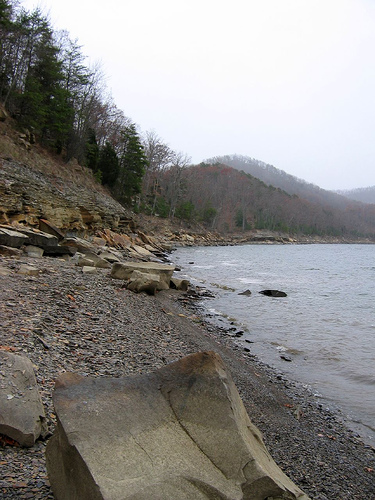
Cave Run Lake, near Morehead, KY
(*photo
credit)
January 21, 2020 Choosing Later Educational Opportunities
Many people had to work hard much of their lives, and in senior years have the additional time for new public service or for leisure educational opportunities. Certainly the road to education can prove haphazard for some, because a number of people are not aware of what would be the best match for their own talents and opportunities. For-profit educational enterprises are often expensive and unconcerned about what is proper for those who want to enter or advance their own careers and work opportunities.
First, all things considered, do it yourself. Self-education economizes time and resources, provided you can see beyond existing barriers and are highly self-motivated. Free information and advice exist for the taking in libraries, over the Internet and through social connections. Know your own skills and set reasonable goals through prayerful discernment. If you feel qualified, launch out on a self-education program, but be willing to accept advice along the way.
Second, learn through working with others. The next best way, after self-education, is apprenticeship to an expert; learn by the experience of being a volunteer in a whole variety of skills and practices from house-building to gardening, some of which are self-taught through many trial-and-error experiences. Most often, people find that volunteering for existing organizations becomes the chance to learn skills quickly that can be applied later. Besides, citizen groups need help!
Third, go back to school after careful reflection. This is not the first, but rather the third, approach when the first two do not seem plausible. Many people take this step first, because peer and advertising pressure are so strong. However, this can be a waste of time, energy and financial resources. Much depends on how serious one is in taking a career-changing path or the studies desired at a particular time. However, educational enterprises want your tuition payments and hardly care about your indebtedness.
Lastly, consider leisure learning opportunities. All work without some play is not a good quality of life. Domestic fulfillment includes spiritual experiences, opportunities to study and learn second languages, and the chance to investigate archeological, historic and natural sites. Furthermore, all people ought to be able o travel to visit family, find cultural roots, and make religious pilgrimages. Fulfilling these opportunities requires transportation, lodging and guide personnel who support a legitimate tourist and education service that contributes to future public service. Mobile seniors may prefer the popular Elderhostel non-credit programs; these senior-related programs were started in 1975 by Marty Knowlton and immediately became popular; and they cover a wide range of subjects.
Prayer: Lord, give me the inspiration to continue my education in some manner so as to stay alert and mentally healthy.
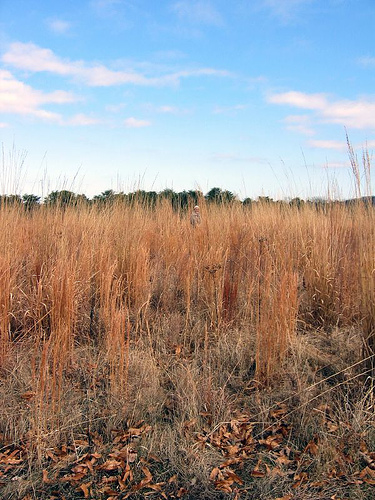
Prairie tall grasses in winter
(*photo
credit)
January 22, 2020 Giving Loved Ones Permission to Die
Appalachians and others have a laudatory practice that involves the moments when death approaches a loved one. They give the person permission to go ahead and die. Some might object that only God is to take the life at a chosen time. However, the practice is really not taking a life but that we all accept God's will to be totally in control. The dying person who fights for mortal life now is disposed to accept mortality in its fullness -- and we are willing to say "God speed." On the Cross Jesus freely gives up the spirit; on our cross we can freely join the Lord in our final hour; as companions we can encourage those dying.
In my pastoral ministry, I find some people linger after the body functions start shutting down; they have no desire to eat more food; they seem to await permission to leave their loved ones behind on their singular faith journey into eternal life. They hold out waiting for the word that it is okay to pass on; yes, survivors will carry on without them. However, the dying experience is not uniform. Certainly those wanting to separate themselves from a bad situation may want to exit as painlessly and rapidly as possible and do not expect permission. Others have a certain confidence that the ones being left will be well cared for. Some who lived a good life do not want to burden caregivers.
We know that on Calvary Jesus "gave up his spirit." He died in that ultimate act of freedom having suffered for each of us. This ultimate free act includes living AND dying. When a middle-aged person suffers much, the loved ones still want their eternal rest to commence immediately; the permission includes the understanding that we do not want you to go, but we also do not want you to suffer more either. Amid it all, we, as the permitting ones, show that we are in unity with God's will towards you. While it is our desire that you linger, it is God's will that must be done -- and we, as permitting agents, are helping you proclaim in a quit way a final "amen."
At the bedside we also surrender once more to God. The dying person receives the permission with peaceful resignation in being released by a loving community. The entire community is in agreement that God's will is being done with or without our blessing, so let's cooperate. We acknowledge together that God, as author of life, invites us to join in this hour of death event when we say "amen" together and mean it. By living with the Lord we are also willing to die with the Lord. In love we were conceived; in love we were nourished; in love we made decisions; and in loving relationships we make our exit at least for a temporary parting of ways. We truly believe in giving and accepting this permission that eternal life, together with loved ones, awaits believers.
Prayer: Lord, teach us to let go -- to permit others to part company for that short period of time until we meet again. Allow us to see that this permission is wrapped in bonds of love and surrender to your will.
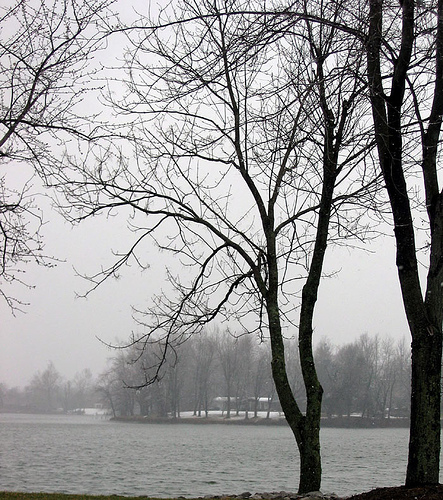
A snowy day, looking across Reservoir #3, Lexington, Kentucky
(*photo
credit)
January 23, 2020 Winter's Moments of Gratitude
As we advance in age any harsh weather, whether summer's heat or winter's ice, seems harder to endure. Thus we may be tempted to grumble about heat or cold and how these extremes reduce our mobility, make us prone to illness, or just seem very unpleasant. However for optimists winter has advantages that are well worth considering:
* Winter's silence gives us moments to stop and reflect on the calling God has given us in very unique ways;
* Winter's crispness sharpens our powers to use the resources at hand far more wisely and efficiently and to dress warmly when we venture in the great outdoors;
* Winter's new snow allows us to see that imperfections can be covered over in mercy, and blemished life can have a new and fresh start;
* Winter's inclement moments can keep us immobile for a time, and thus help us to avoid the busyness of everyday life;
* Winter's difference from summer enables us to appreciate each season in its own turn and to adjust our lives to live each more fully;
* Winter's darkness affords periods for sound rest that is so welcome;
* Winter's wildlife makes us aware that others brave the cold and even beckon for our largess in order to stay alive and flourishing;
* Winter's stirring, while ever so faint, makes us strain to find new reasons for hope for a springtime that at times seems so distant;
* Winter's nakedness manifests the forms of trees and landscape and the human artifacts that punctuate the frozen countryside;
* Winter's moonlit nights give us a sense of enchantment at our sister the moon, and its gentle way of enlightening us more brightly in this season;
* Winter's warm food and drink comfort the uncomfortable and spark renewed gratitude for having a contented belly calling out for more nourishment to keep us going;
* Winter's muffled tunes give us a chance to hear occasional pronounced sounds of nature: the hoot of the owl, the howl of the coyote, plaintive tweet of the wren, and even the crunch of snow beneath our feet;
* Winter's time invites us to use things wisely, for flowers will soon be here, and yet we are challenged to continue our more burdensome physical exercises; and
* Winter's very harshness affords us opportunities to encourage others, who find the season hard to endure, to walk with a more careful but meaningful step.
Prayer: Lord, when thanksgiving seems harder to make, give us the added inspiration to look into deeper gifts so often hidden from our eyes; help us see winter's many mysteries.
Faith-filled Environmental Action
By reflecting on our practical experiences and deepening sense of respect we can designate several actions that will help us save our wounded Earth:
1. Develop a Conservation Ethic. During the dead of winter conserving domestic energy is highly appealing, for our unheated living space can become uncomfortably numbing; we need extra clothes when both out- and indoors; we are inclined to eat more calorie-packed and fattening foods; we stock our pantries for fear of a paralyzing storm; and we keep our vehicles winterized for emergencies. A good conservation ethic is counter to the extravagances accepted as routine by our over-commercialized culture. In a fantasy world we discover many institutions seek to be "green" and yet never audit food waste, overheated space, or the conversion of greenspace into additional parking. Harmony with creation propels us to adapt a conservation ethic, one where waste and litter are ungodly and each must be addressed thoroughly.
Waste is a blasphemy against an all good Creator; litter betrays a wasteful ethic and tolerates practices that erode the spirit of communal life and good order. Waste shows basic insensitivity and lack of sharing at all levels. Once I asked a manager of a Southern church why the window was left ajar. His reply was, "Don't worry; we can handle the extra heating bills." Some believe that having enough is a license to use as much as one desires -- an attitude that eco-spirituality must confront. Conservation demands self-control and wise use of entrusted resources. Once at an energy ethics summit the question was posed: if solar energy is almost free, can we use it without regard to conservation? Solar energy proponents' answer is that it even takes resources to start, maintain, distribute and utilize this renewable energy. All use must occur in a respectful manner.
A conservation ethic teaches a proper use of goods. More material things requires more effort: attention to acquire, maintain and secure these goods focuses attention that should be directed to the needy; time, talent, and opportunities are squandered while a wasteful attitude dampens the spirit of urgent change. Creation is more than a wonder simply to behold; it invites understanding, protection, preservation and respect by all; exploiters must be challenged and confronted. This ethic is enhanced by specific actions: recycling, water conserving practices, bulk purchases and batch cooking, installing LEDs for lighting, and use of energy efficient transportation vehicles.
2. Establish a Specific Prayer Time. The eco-activist must extend practical conservation measures to the realms of spiritual communication. Prayer is for all, not just a chosen few. At times we pray alone and at special times and places we offer formal prayers in community -- but whatever way we are always to pray. With respect to the conservation ethic, we need to budget our time so we have moments devoted to this practice. Isn't it proper to focus attention and be willing to set aside sacred time? Prayer time is specific daily rest, and requires control and discipline in attention given and regularity in practice; it's an opportunity to build relationships with God, not for God's sake but for us.
3. Speak to others about environmental issues. We must be willing to confront climate-change deniers and fundamentalists who neglect to become environmentally concerned. Deniers cannot admit past wrongs; fundamentalists harden their hearts and refuse any openness to change, an utter necessity if we are to save our wounded Earth. In Eastern Kentucky I am surrounded by a sea of fundamentalism that holds a literal and highly restricted meaning to Scripture; many of these fear they will lose their own cultural identity if they question their Bible's words. For those of us who are comfortable with evolutionary thought, a demand for a better Earth seems fully in keeping with our essential worldview.
This position, which seeks to profess a meaningful eco-spirituality, affirms evolution as a biological theory in all its natural grandeur, professes theologically the intelligent design of the God of creation in all divine grandeur, and accepts the possibility of knowing God through natural theology. We are drawn into using our hands to perform deeds of practical creativity within a conservation ethic; we raise our minds in prayer for guidance and praise; and we extend our insights in hearts filled with love and compassion for wounded people and Earth herself.
We delve into mystery and look into the crystal clarity of winter landscape; we hear our individual calls within calls and yet also take time to listen in the stillness of a winter night to the motions of change beneath our feet; we taste God's great creation and yet respect some portions as being too toxic for our own assimilation; we detect the aroma of harmony that embraces our use of hands, head and heart; we seek to touch our part of a fractured Earth and try to feel the exuberance of creative activity in the movement to profound change. We must act and not deny the problem, or expect others to act who are supposed better suited, or excuse ourselves as too stressed out to act now.
Summary. January is that precious time to glimpse into the depths of Divine Mystery, for hearing the call of our particular vocation, for tasting the sweetness of being at home in the Cosmos, for sensing the aroma of harmonic motion, and for touching in imagination the wet clay being molded into an artifact. In January we survey the elements that make us who we are, our sensitivity to space, time, and social connections, and our goals for the year. While we can extrapolate from this process, we return to it, for the process is potent with creative potential. In warmer months we will talk about the particulars of our journey of faith, but now we concentrate on our sensory perceptions, our basic and raw experiences, and on how these have both individualistic and socially cooperative components. January beckons us to push on ahead for there are many challenges in the coming months.
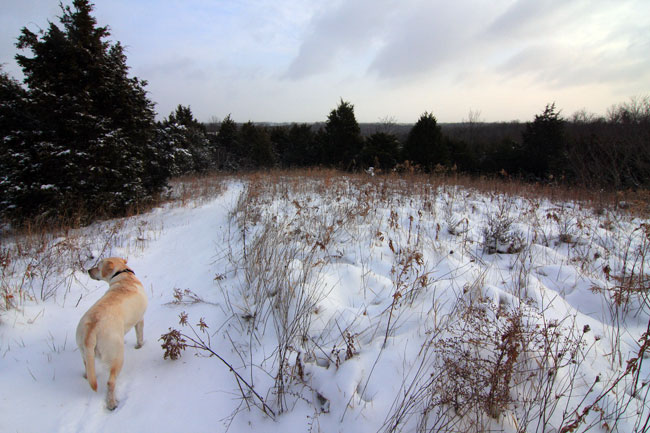
Winter hike on crisp winter morning with beloved pet.
(*photo credit)
January 24, 2020 Championing Plenty of Sleep vs. Enough Sleep
How much sleep do I need? In the past I regarded this as a question that allowed the time awake to be extended to the limits.
In essence, I now see that "need" may be more broadly defined and that my length of a combination of sleep and nap time has been extended by an hour or two. Really the silence of January is a perfect time to reconsider necessary sleep versus the luxury of getting enough for being able to live an efficient life. January is the sleeping month, when nature is in the middle of its winter rest. We ought to broader our needs category, for some experts say our country suffers from lack of sleep. This lack results in deterioration of health and excess stress that can affect major and minor decisions in the workplace and human relations. How many broken marriages and accidents have been caused by simply not being rested and free of strain?
My attitudes about "enough" sleep have changed over time; in earlier reflections I considered that six hours sleep per night was sufficient. However, relief from strain cause me to expand the concept of satisfactory amounts to be in the eight hour range now. That includes a break in the middle of the night for meditation and a snack as well as the customary hour of nap after mid-day lunch. However, this is also flexible to some degree and that allows the conviction that some days demand more sleep time. Take it!
Sleep length depends on one's physical and psychological makeup. Some people need more sleep and some in history (such as Presidents James Madison or John F. Kennedy) are known to have survived on less. However, since we are not fully aware of personal circumstances, some of the sleepless ones might have had improved social relationships had they indulged in more sleep. They prided themselves on less sleep but could have been unaware of the changing habits and responsibilities with age. It is possible that with aging there is a need for more rest time that should not be denied. Failing to sleep a little more could involve not caring properly for one's personal health.
Do some of those who demand more sleep want to fill the day with something to do? Thus, does their unacknowledged boredom convert into a need for extra sleep as useful filling up the twenty-four hour span? By testifying to their need for longer times of sleep they have less need of doing things that they find boring or burdensome. We dare to ask whether oversleep may be somewhat unhealthy for some who need more companionship. However, between lack of sleep and oversleep is a happy medium, a time of allowing for additional sleep when needed and less sleep when important things press us to spring out of bed and engage in work. January is perfect to learn about life's rest/active balance.
Prayer: Lord, allow me to know my needs and also my excuses; permit me restful sleep when sleeping and wide awake when driving, talking, reading, praying, and working; let each have its time.

Gathering of the herd. Cows in Washington Co., KY.
(*photo credit)
January 25, 2020 Bringing Oneness to the Christian Community
We need to be at ONE with the Lord and at one with each other. Today, this is what the conclusion of the Church Unity Octave is all about. On this Feast of the Conversion of St. Paul we strive to realize our connectedness. Paul understood better than others of his age that our world of Greek and Jew, male and female, slave and free, had to come together in a unity that was missing in the culture in which he lived. People saw others in black and white terms; some were of irreconcilable racial, cultural and national origins; some were economically pronounced to be privileged and others not. Paul realized that the Good News meant we are all together in Christ for Jesus died for all, not just for a few.
Our oneness is thus founded in God's will that we be one people in one world. To make divisions and to perpetuate these divisions goes against that salvation for ALL. Since "catholic" means universal, the inclusion of others in the layers of unity is part of our sacred mission and goal. We do not want to hinder the act of coming together in any way -- and yet our misdeeds do. We recognize that our sinfulness has caused disunity and has hindered the movement of the Spirit in the great act of Pentecost, which overcomes the Babel separations bring disunity to humankind.
Being at one in the world. On this outer layer of "oneness" we are committed to harmony among nations and people in making this a higher quality place for all to live in peace and prosperity. Our goal is to eliminate hunger and want in all its forms or else, instead of oneness, we will have essential insecurity. Here at this level we join with all people of good will, especially those who live righteous lives and believe in God's mercy and goodness.
Being at one among Christians. On a more intimate level of love we seek to join forces with other Christians who speak up for the freedom of all peoples and who strive to work together for a decent life. Here church communities need to work together in our collective journey of faith. We become one with others in a very special bond of Baptism and wish them well, not knocking their beliefs or efforts, but striving to enhance their own ministry, especially with youth, elders, the sick and the disadvantaged. We wish them well; we pray for them; we bless them in what they do.
Being at one within our Church. We need to see this unity as something that our community seeks to bond us all the more closely in troubled times. Thus we pray for and come more deeply to a commitment to each other within our global and local faith community. We strive to think with the Church; we encourage others; we have a deep sympathy with the leaders of our Church and their great struggles to sustain discipline and to grow in mutual understanding and respect for each other. We need to love and bless the efforts of all co-believers.
Prayers: Lord, teach us to be at one, as Christ is with us, and we are called to be with each other.
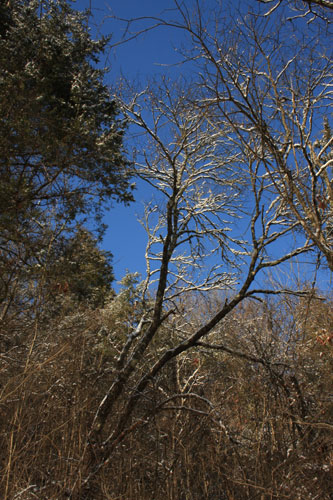
Blue January skies
(*photo
credit)
January 26, 2020 Urgent Times Demanding a Reformed People
Reform your lives! The kingdom of heaven is at hand. (Matt. 4:17)
We live in urgent times of financial crisis, of political turmoil, of seemingly unending war, and of environmental disaster in the most likely offing. Enough has been written and said about existing troubles to make us move on to a more positive discussion, namely, what we can do about it. We need not be tempted to deny what is happening, to excuse ourselves from acting when we do perceive the trouble, or to seek to escape to more pleasant thoughts or activities.
Jesus calls us to listen to his word and heed it. In the urgency of his day, Jesus sets before us a call to be an observant and reformed people, who will take up the activity needed through a joint cooperative endeavor. The Gospel passage we hear today has a twofold aspect, Jesus proclaiming an urgent need, and his call to his disciples to assist his mission. We too hear and seek companions to help carry on the work that is ahead of us -- for we cannot do it as lone rangers. We are called to be a hopeful Church working together as an encouraging community of believers.
The first portion of the message involves knowing the urgency of the times; this takes a sensitivity to distinguish the many competing tendencies that confront us at any given time. To reform in this age means to settle down to living simply without all the gadgets and distracting allurements. We are to distance ourselves from those who race for the best salaries and the good name and respect of the wealthy and privileged. Down-sizing is necessary for those caught in the clutches of our secular culture. Giving time to reflection and caring for others must be part of moving in the direction of self-denial, simple living, and a conservationist ethic. Certainly, part of the lack of reform is entwined in the urgent situation itself. Breaking away becomes a challenge.
The second aspect is that we need community to encourage and enhance our commitment to the Lord. Apart from some being granted extraordinary graces of perseverance, believers need others to comfort us in rough times and ease their journey to simplicity. A spirituality that is communal in nature and that expresses together gratitude for gifts given is our goal. By suffering with others in these urgent times, we take on a "compassion" that is utterly needed to make all grow in a sense of solidarity -- groundwork for a world where we can jointly reclaim the commons that seems so far from us right now. By responding enthusiastically we affirm the urgency of the situation and the willingness to be party to healing our threatened Earth.
Prayer: Lord, give us the honesty to see what must be done and the courage to start the process, for time is short. Help us to be part of your divine voice leading others to take brave steps to reform their own lives and work with all as one body.

Work in progress as butterfly visits flower.
(*photo by Sally Ramsdell)
January 27, 2020 Support Language Revitalization
Through past Daily Reflections we have discussed the anticipated demise of half the world's six to seven thousand languages in this century. These disappear at a rate of one every two weeks, and the picture is bleak. Hundreds of tongues have reached levels of tens or hundreds of speakers, and these being very old people. However, the picture does have some glimmers of hope, as people identify their own endangered languages and record songs, tales, and dictionaries for an effort in retaining these treasures. My grandparent’s Alsatian is one of these languages.
David Harrison in his book, The Last Tongues, mentions some areas where youth within the culture have taken it upon themselves to sing, rap, and speak the endangered language of their native village or region. When these speakers see a value in retaining a tongue that is being threatened by a major language in their area, they make an effort to learn to speak it from their elders, and thus the young grow in respect for their cultural heritage. Professor Harrison is convinced that if the young are able to learn and retain the language, they can pass on this unique heritage that includes personal stories, creation myths, songs, native medicines and many other aspects of valuable folklore that are not easily translatable to a predominant tongue.
Language revitalization is promising and can be done provided the language is not at death's door with the few last speakers unable to pass on a tradition to interested younger members. Much depends on the critical span of time and the enthusiasm of younger people; if they are interested, then the language will survive; if they do not show interest in what the elders say and do, then all of a valuable language, like an exotic plant or threatened animal, is lost forever. It is not enough to simply record the remnant speakers; vitality calls for carrying on that vital cultural force to future generations through spoken word.
Threatened languages require the same effort and resources as do threatened flora and fauna species. First, the threat must be discovered and identified. Next, those who work with such threats must enter into the cultural area and interest younger people to take up the issue. Third, the efforts at preserving must be publicized and rewarded to some degree. Governments must take pride in these treasures in their midst and allot resources to encourage their preservation. By giving a sense of worth to the speakers and creating a series of exercises, educational programs, cultural events and other innovative activities, the picture could change quite dramatically. Young people learn faster and can find and exude pride, especially when their efforts are rewarded. Finally, an international effort must be made to save this precious commons' resource, for living diversity enriches us all.
Prayer: Lord, teach us to value global cultural diversity, and to see this as worthy of support, especially by those who wish to revitalize their threatened native languages.
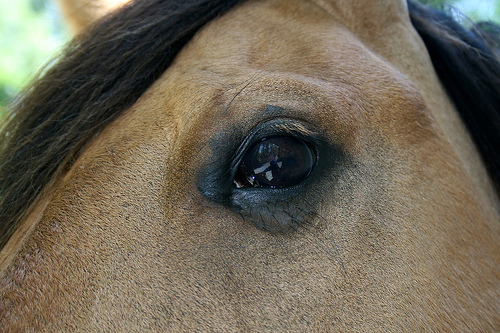
Resident of a horse camp near Cumberland Gap National Park.
(*photo credit)
January 28, 2020 Critiquing the Current Economic System
We have an economic system that tolerates a massive disparity of wealth (see January 3rd Reflection) with one percent of the top owning more than half of the bottom half of the population. This tolerance for immense differences is seldom questioned in our society and could be likened to a state religion. Many regard it as unpatriotic to question exclusive ownership by those benefitting from massive tax breaks. These privileged few are looked up to by the have nots and this results in using meager wages to buy lottery tickets to enter that limited class of billionaires. For those who strive in this fashion it is similar to a prosperity megachurch where leaders with bejeweled rings act like gurus to be modeled.
When we are submerged in daily and hourly Wall Street reports and the day-to-day accounts of economic progress, we may question our own ability to make a difference. The temptation arises that we cannot change the situation and ought to live with what we have and be thankful for it. This temptation is part of the propaganda saying the public is helpless; the best is to accept where we are and not envy the privileged -- as though the fault is with the poor. Granted, some questioning of this tolerated system is in order; failing to question the system is taking a partisan position, a stance that we cannot make a difference, and that our cry in the wilderness will go unheeded.
On the contrary, every voice raised gives a co-patriot the encouragement to raise his or her voice questioning this immoral and perverse system. Here we can take a stand that each citizen can help bring about change and that our political influence can become contagious -- if we but continue to act bravely and publicly. A system that accepts accumulated wealth as the linchpin of progress demands the acceptance by a democratic public of its accumulation of wealth. It tempts us to doubt and thus postpone collective decisions. This imperfect system continues to flourish on lack of faith on the part of the democratic body politic. Some who do not believe they can change the system will either look to leaders to tweak the system, or try to encourage a volunteerism by the wealthy that mitigates the system's abuses.
We need faith as Jesus says that can move mountains. With faith the system can be changed, and we can do it together with like-minded believers; we are the catalyst, the points of change that can accelerate the process that can confront and overcome the disparity of wealth. We need to call for fair taxes, the simple and most democratic means of equalizing the wealth of our people. These taxes are meant for the good of all the people -- and we can make this happen by backing candidates for public office who are taking a courageous stand for social justice. Some are emerging and they need our full support in this election year. Collectively the grassroots can bring about change if we are willing to act.
Prayer: Lord, teach us the power through faith in you that we can improve the lot of people by our collective action.

Sunset.
(*photo by Frank Fritsch)
January 29, 2020 Preparing for Dying: A Worthy Exercise
As one ages the life insurance policy offers become more frequent. Welcome to the club! Yes, most people prefer to avoid the unpleasant thought of dying, especially while in reasonably good health. However, we can make the most of any circumstance and, since we are certainly going to be involved in dying in the indefinite future, it is appropriate to see this one of our personal concerns. The challenge is to make this issue a beneficial social event to some degree, and to on rare occasions talk the matter over with close friends and relatives. It is humbling to realize that we cannot fully control that final event of dying but comforting to know we still have some remote input.
Remote preparation is a teaching opportunity. All of us in full use of our mental faculties can prepare for death as a natural occurrence. Our financial and other preparations are good indicators that we take the natural in stride and affirm our participation in a singular and yet shared human experience. Dying is not to be denied but is coming inevitably. None of us is familiar with that once only definitive event, but we can look ahead; we can select funeral songs or burial places or final rites. All of these affairs have a finality that tells others we are prepared to move on to eternal life. Remote preparation shows a limited control of what is ultimately beyond our control.
Proximate preparation is an additional golden opportunity. First, people who die a happy death give vast comfort to those loved ones left behind. They show that the Kingdom of God is already beginning here and now. To go with a satisfaction that the passing is a completed accomplishment is a good thing -- a happy death. Those who stand near realize that their presence even in their utter helplessness is important -- a testimony that God is really in control and we are accepting. A public Litany of Thanksgiving can be said by those present when the dying hear but cannot speak; the mercy of God comes in our praise of the Divine Will now manifested in a special way by a natural dying event.
Immediate preparation is more problematic. Our wish is to die in comfort, and not in utter agony. Here we trust in the mercy of our Creator. None of us is sure of that final moment, and so we act wisely and know it will come shortly. Those saying the "Hail Mary" with devotion will be assured a happy death -- and I have seen it happen often. Some say the greatest immediate preparation is a good remote one. Expect that this most precious moment of life will come with a world closing in around us, and we experiencing our powerlessness and dependence on God. Remembrance of past faults, even forgiven ones, still cloud the memories of some. Assurance of God's mercy by those near at hand will make the passing a truly satisfying one. In other words, those attending the dying person create a comforting atmosphere for the final passing to the Lord.
Prayer: Help us, Lord, to always be prepared.
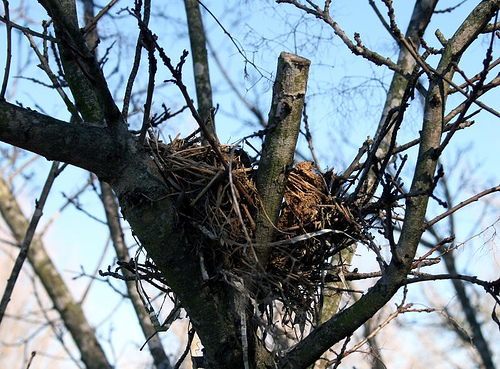
A warm nest for shelter.
(*photo credit)
January 30, 2020 Identifying Reclaimers of the Commons
We like categories, groups, parties, allegiances, and other gatherings of the like-minded, as do those of us who want to reclaim the commons for all people. No special title of more than one word is satisfactory, and so Reclaimers of the Commons hardly suffices popularizers. Neither does "commons do-gooders" make much sense and even conveys a volunteerism that seems the opposite of what is intended. Titles have to be snappy and yet precise and directly related to what is desired in entitlement efforts.
"Reclaimers" is not exclusive. A reclaimer could be someone who is reclaiming land that is damaged by erosion, salination or deforestation; it could be a person who is reclaiming title to property that was removed by just or unjust causes; it could be someone who takes back a privilege that has been wrested away through outside causes. However, those who reclaim the commons do the same activity performed by other reclaimers, and so the title is proper even if not at all exclusive.
Communists has some of the hallmarks of a commons for the people, but a sorry history of the twentieth century makes this a burdened legacy of Stalinism, Castroism and Maoism that will be hard to bury for those who have suffered through the communism/statism that suppressed individual freedom, religious expression and personal property rights. Had that history not occurred, the communism of the early Church as found in the "Acts of the Apostles" would be a propos. The operative principle, "to each according to need," makes sense. But why burden reclaiming the commons with a title that only adds pain, burdens, and political negatives -- for few realize the Biblical roots of this political system? Many who champion the Good Book wrap themselves in the banners of Godless (not godless, for money is idolized) capitalism. Disentangling can be very difficult.
Commoners is certainly not perfect as a title either; while precise it lacks the virtue of snappiness; it does contain a particularly humble and simple note, for it recalls the lower of the three estates of France or the alternative to the House of Lords (nobles and clergy) of England. We are all part of the commons and so this becomes inclusive, even when we partly acknowledge that an implicit nobility of wealth still exists in our midst. I prefer this as a temporary title, for it is what is intended. In accepting this title we acknowledge that currently our country -- and world -- are dominated by the privileged wealthy who decide policy and how their wealth is being expended. Our hope is that this form of undemocratic nobility is temporary. Some can attain this through creative genius, inheritance, or purely good luck. However, we do not have to accept its class legitimacy. All things considered, what do you suggest as a better title than Reclaimer of the Commons?
Prayer: Lord, allow us to work for a better understanding of how to spread the Good News in all its expressions and nuances.
Towards an Authentic Eco-Spirituality
We need to be balanced Earthhealers and that calls for an authentic spirituality willing to undertake the vital task before us. We are aware that spiritualities from evil sources have brought us to the present condition; these are self-centered and hateful of certain groups; these are not humanly fulfilling and capable of saving our wounded Earth from impending climate change. An impoverished spirituality is reflected by a classicist who, upon hearing that half the world's languages will disappear before the year 2100, said "who cares, the others aren't worth much anyway." The inability to recognize value in variety of human language and culture extends to disrespect for plants and animals and rich diversity, which enhances our wonder in celebrating creation.
A number of components of authenticity are worth noting. First, an authentic eco-spirituality (AES) involves interior balance at the individual and community level. We are called here and now within a community of like-minded people. We grow in understanding our responsibilities as citizens of this fragile planet in taking proper remedial action to protect and renew what is damaged. As agents of change, we need good physical, mental and spiritual health to be proper instruments for such an undertaking. To preserve this health an AES calls us to simplify our lifestyle; thus, we can resist temptation to follow the wasteful habits of an addicted consumer culture; we can be models for others to follow; and we be encouraged to adapt lower resource consuming practices, which are better suited to supporting a just and equitable world order. Our goal is to preserve what is present, protect what is threatened, and heal what is damaged, all while confronting the greedy and insensitive who threaten the global ecology.
* An AES is acceptance of the here (current situation of our immediate locality and fragile Earth). We see nobility in being down-to-earth and in touch with our local environment and the fullness of creation below our feet. Starting right here gives us a sense of orientation, of direction, and of kinship with other nearby creatures; we extend our respect for them through human/non-human interaction. We journey together with all creatures of the Earth. Our collective welfare is closely linked with each other, a rainbow gathering of many species in one fellowship.
* An AES manifests an urgency of current problems now facing our human community and Earth herself, which must be addressed at once and not postponed. If we fail to act now concerning climate change, our Earth will face an unprecedented catastrophe. By acting we become more deeply concerned about the poor who lack wholesome food, clean water, necessary energy, and affordable housing. An AES accepts the kairos, the now of our life. Others may potentially perform a better job, but it is risky to wait for them to come forward by chance. We must seize the moment with our limited resources, confident that our imperfect but good intentions will inspire the more talented to join us in the struggle.
* An AES is an awareness of our communal togetherness, the we who are spiritually committed to working together being both victims as well as healing agents. We (not they) are willing to look squarely at misdeeds done to our Earth by human greed and ignorance. However, we still must control our emotions so that we can perform effective action. We cannot excuse ourselves from entering into the action, nor deny that the injustice is occurring, nor follow the temptation to escape and leave the battle to others.
* An AES is assessing our limitations and being willing to seek assistance in collaboration. This involves an ongoing discernment process, which sorts out eco-problems in the light of our ability to pinpoint them and to judge how much our personal and community resources are able to challenge them. Through proper discernment we discover the good spirit prompting us and, simultaneously, distance ourselves from evil and wayward temptations. We affirm as believers an all-good God creates, redeems, and invites us into the noble task of re-creating this damaged Earth. We enter into this mystery with praise, compassion, and a willingness to celebrate the diversity of creation.
* An AES affirms ecological principles that are spiritually uplifting by manifesting the glory in God's Creation, showing compassion with all who suffer, and practicing the healing arts: 1. All creatures are interdependent. We human beings are not splendid isolationists, but caretakers on a modern day Noah's ark or spaceship Earth. A spirituality of overlords, masters, big game shooters and colonialists encourages a conquest of parts of the world for selfish purposes. Upon prayerful reflection we see that the goodness of the Creator is reflected in all creation worthy of our respect and sharing. We embrace other creatures, so that in protecting our local environment we reach out to wider vistas.
2. Natural processes obey the Law of Conservation of Resources. We are both interconnected and we suffer together. Nothing is lost; all suffering has ultimate gain. A spirituality of compassionate concern directly confronts sources of suffering such as disease, pollution, resource depletion and climate change and thus enters more readily in solidarity with co-sufferers. Compassionate people do not wish for or condone suffering, but accept it as part of a deepening mystery of human and ecological redemption. Compassion with other co-sufferers is a hallmark of a deepening spirituality and requires emotional balance.
3. Variation and richness of diversity add to the health and harmony of the total eco-system. The richness of ultimate well-being of the Earth depends on the interaction of a greater diversity of beings. The beauty, wholesomeness and ultimate health of the system is fragile and needs our active guardianship. We celebrate the rich diversity of plants and animals around us and seek to preserve and enhance this as part our mission in life.
Finally, we celebrate interdependence, solidarity in suffering and diversity with a sense of joy at being able to confront evil and work for good in this critical stage of the divine movement to a New Heaven and New Earth.

Icy winter
scene in Kentucky
(*photo
credit)
January 31, 2020 Reviewing Our American Freedoms
Challenge: Are our national freedoms threatened?
Tomorrow we celebrate National Freedom Day and today is the birthday of President Franklin D. Roosevelt, a great champion of freedom. We can become somewhat blasé about our fragile freedoms thinking they remain a permanent condition; they can be lost through lack of vigilance. Freedom is threatened in various ways: a Moslem community is denied a permit to build a place of worship; migrants are imprisoned for illegally crossing the border; homeowners suffer from invalid foreclosure procedures; the unemployed cannot move elsewhere because their home is "under water;" small store operators pay a local gang for protection; youth are bullied by schoolmates; the unemployed are silent to their "right to work;" middle managers are forced to teach foreigners how to perform their own soon outsourced-jobs; the unjustly accused on Facebook have little recourse to refutation.
Who knows how many examples can be exposed in this "land of the free and the brave"? In some ways globalization, broadened information retrieval, dumbing down of the media, instant sound bites, unchallenged invasion of privacy, erosion of civility and respect, and a host of other causes contribute to threatening our cherished freedoms. Gone are the days when someone in financial or social trouble could pick up and move to another state and start over again without a paper trail following him or her. This inability to start afresh is actually a severe restriction on our current freedom.
Yes, our precious freedoms can be spelled out more easily than they can be fully operative in concrete situations. Each of us attempts to live our lives and yet barriers exist, many of which we are simply unaware of until we bump into them. We break a parking rule; we find that a credit card has the high interest rates listed in the very fine print; we run into opposition from a mean person wanting to own something we possess. While some today call for less government, that condition certainly does not guarantee more freedom for all, but rather more risks of seeing our precious heritage eroded by the unscrupulous few. Our busy lives demand protection from those who seek ways of taking advantage of us. By asking how we can protect what we have, we become alerted to the dangers that threaten our fragile freedoms.
We must support a respect born in sincere religious practice and loving service to and with others. An insular "spirituality" leads to isolation and self-interest that closes out relationships of respect. Authentic freedom gives space to others to exercise their convictions and not conform to secular norms of conduct, from lawn-grass size to hair style. Freedom can be threatened by the complacent, the bully, the cowed, or the super rich.
Prayer: Loving God, teach us to be free before you, and to protect the freedoms of all around us as a service of love.
|